

HERE FOR YOU
Our Helpline Care Navigators are here to support everyone affected by PSP & CBD. Each Helpline Care Navigator has a designated area (see map) where they provide proactive support, including:
• Information on all aspects of living with PSP & CBD, such as symptom management, benefits and entitlements and everyday living
• Emotional and practical support
• Contact details for local support, which may include Support Groups
• Information about how PSPA can support you
• Information about health and social care and how to access these services
• Signposting to other sources of information
• Referral for non-means tested benefits applications via Department of Work and Pensions (DWP) home visiting service
• Supporting evidence about PSP & CBD for Blue Badge applications and Continuing Healthcare applications
• Provide specific information written for health and social care professionals and access to Education Volunteers.
Our Helpline and information service is available Monday to Friday 9am to 9pm.
Tel: 0300 0110 122 or email helpline@pspassociation.org.uk
Margaret Powell House, 415a Midsummer Boulevard, Milton Keynes, MK9 3BN
CATHY MOUGHTON
JULES BROWN
JAVERIA SHAFIQ
DEBBIE RUDDOCK
KAYSHA MARLOW
As the year ends at PSPA we’ve been thinking about what we have achieved in 2024 and what our goals are for 2025. It’s been a year of lots of new arrivals in the team and it’s great to finish the year with an ambitious plan for 2025. Look out for more news on this in the next edition of PSPA Matters.
In September I attempted to complete the Thames Path Ultra 100km walk as part of our 30th anniversary year, unfortunately I had to drop out after the first 50km due to injury. Despite the pain, overall, I did enjoy it, and I am pleased to have been able to raise more than £1,500. It has given me a newfound respect for all our supporters who have completed amazing feats for PSPA. A special shout out to Harry Squires who ran the full 100km over the two days!
In October I attended the Neuro 2024 conference in Toronto with the world’s leading Neurologists in PSP & CBD. It was a great opportunity to learn about the latest scientific developments, and to contact researchers to discuss our plans to start releasing some of the funds that we have raised through our research appeal this year. The Understood Appeal has raised more than £600,000 of the £2 million target so far. If you are wondering why you don’t know about the appeal, that is because we have largely been working on it in the background. Whilst we want to raise lots of funds for research, it is important that in doing so, we don’t hinder our usual income that funds essential services like the Helpline and the literature we provide. Read more about the appeal on pages 20 and 21.
Finally in November, I took the opportunity for one last support group visit this year and went to see the Devon and Cornwall Group that started in 2024. November’s meeting was in Exeter and it was great to see how quickly the new group has bonded. We are so grateful to all the volunteers who keep the support groups running, it is so important that people affected by PSP & CBD get to meet other people in the same situation and the support groups are a perfect mechanism for this.

Rebecca Packwood PSPA CEO
USEFUL CONTACTS
Main contact 01327 322410
info@pspassociation.org.uk
Helpline 0300 0110 122
helpline@pspassociation.org.uk
Fundraising 01327 322414
fundraising@pspassociation.org.uk
Volunteering 01327 368597
volunteering@pspassociation.org.uk

Rebecca Packwood, CEO 01327 322413
rebecca.packwood@pspassociation.org.uk
Carol Amirghiasvand, Director of Service
Improvement and Development | Deputy CEO 01327 356137
carol.amirghiasvand@pspassociation.org.uk
Helen Chapman, PSPA Matters Editor 01327 356135
helen.chapman@pspassociation.org.uk
Megan Hodgson, Research Coordinator 01327 322418
research@pspassociation.org.uk
PSPA NEWS
GOODBYE AND THANK YOU TO PROFESSOR
JAMES ROWE
A special thank you to Professor James Rowe, who stepped down from the Research Committee this summer. Professor Rowe joined the Research Committee in 2020 and was previously a Trustee for PSPA. James has contributed a huge amount to PSPA over the years and has helped to ensure that PSPA funds the highest quality research, as well as supporting the launch of our £2 million Research Appeal.

HELLO TO COLLEEN
Meet Colleen Wren, our new Communications and Influencing Officer who joined us in September. Before joining the team, Colleen worked as an Internal Communications Assistant at several organisations. She’s looking forward to working on PSPA Matters and our social media channels.

HELLO TO KAYSHA
Kaysha Marlow has recently joined our team as a Helpline Care Navigator. Before joining PSPA, Kaysha worked for a charity supporting unpaid carers and the people they care for.
Kaysha said: “Although I had heard of PSP before applying for this role, I didn’t know too much about it or CBD. However, from personal and professional experiences, I’ve heard and seen some of the challenges of accessing support and information for people living with a health condition and their families.
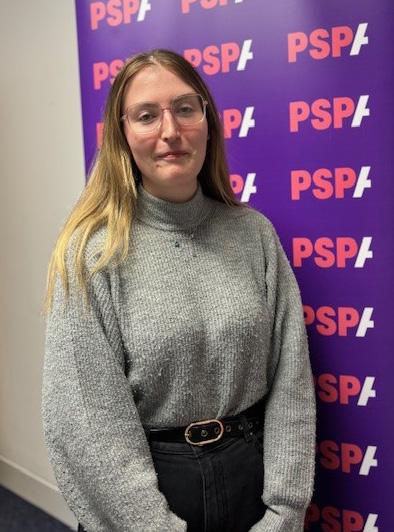
“I’m looking forward to supporting people living with PSP, CBD and their loved ones, helping them navigate and gain the support and information they need whilst providing a listening ear. I’m also looking forward to raising awareness of PSP & CBD to health and social care professionals across Greater London, Surrey, Kent and Essex.”
Colleen said: “I was very excited to be joining the organisation. I wasn’t aware of PSP or CBD, so getting to be a part of the charity is teaching me a lot about these conditions. It’s exciting because there’s a lot of scope in my role to help amplify what PSPA does, how we support people and what we want to accomplish moving forward.” 50% off
CHRISTMAS SALE !
Bag yourself a bargain while also supporting PSPA. Selected limited edition 30th commemorative products are now reduced by 50%. Visit our online shop to buy one of the special birthday items shown below. www.pspassociation.org.uk/fundraising/shop

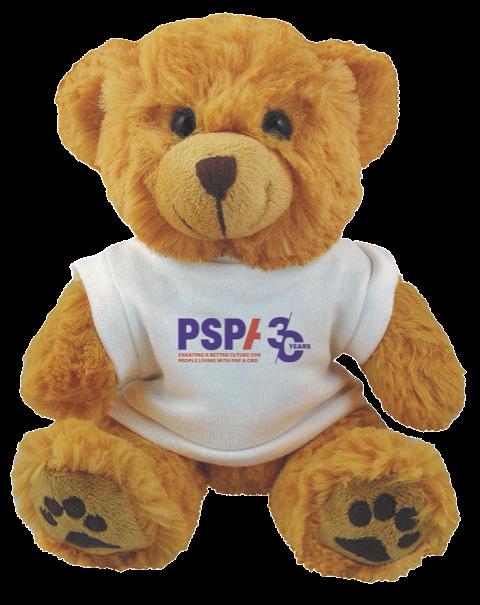
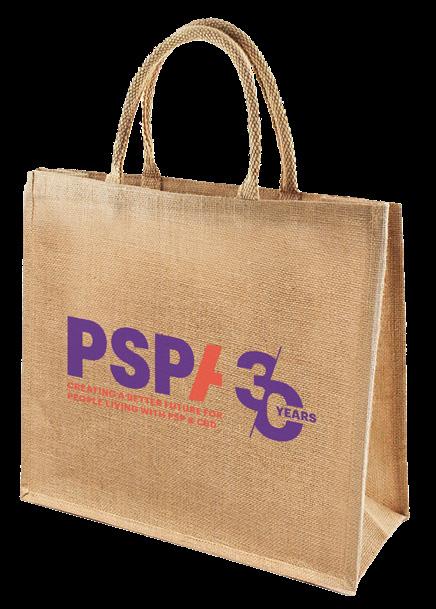
GET FIT AND RAISE MONEY IN 2025
If you’re looking for a challenge in 2025, why not consider these two upcoming events.

Winter Walk
The annual Winter Walk is taking place 25 to 26 January at The Oval Cricket Ground. This event is unique because it offers different distance options including the full marathon, half marathon and 10km options.
The routes will take you around London’s iconic landmarks including the River Thames and historic bridges. Whether you take part on your own or with family and friends, there will be lots of support along the way, with rest stops, snacks, a medal and hot food will be waiting for you at the finish line!
You can find more information about how to sign-up and fundraise on our website www.pspassociation.org.uk/ events-list/london-winter-walk/
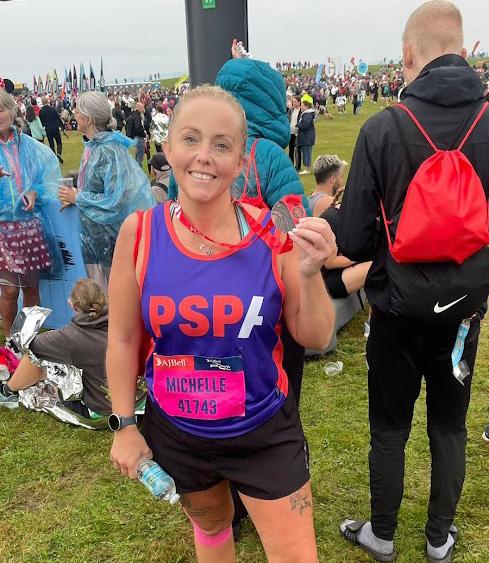
Great North Run
Applications are open for the iconic Great North Run! The Great North Run is the world’s biggest and best half marathon. Over 60,000 runners run and walk the well-known route from Newcastle to South Shields every year.
This year we had a team of 21 including three who took part in the junior race. Together they raised an incredible £11,000. With this great work in 2024, we are keen to make 2025 the biggest year yet. The ballot will open in January 2025 so if you want to be involved with this historic event, challenge your fitness, and raise money for PSPA, please visit our website www.pspassociation.org.uk/events-list/great-north-run/
NEW GUIDE TO PSP & CBD FOR MPS
In September we launched a new guide to PSP & CBD for Members of Parliament. In addition to their work in Parliament, MPs have a vital role supporting local constituents with everything from accessing benefits to sorting out problems with public services like healthcare.
Most MPs might only come across a small number of people with PSP or CBD during their time in office,

CARER'S SURVEY
Understanding the views and feedback of carers enables PSPA to develop services that best meet their needs. Earlier this year we conducted a carer survey of 227 carers. Overwhelmingly carers shared how much they valued the support PSPA provides, with the support groups being particularly appreciated for both enabling them to connect with others in similar situations and for gaining knowledge.
Seven in ten carers said that attending a group improves their wellbeing. The survey also revealed how over eight in ten would recommend the group to another carer. We were pleased to see that almost eight in ten carers said they know where to go for help.
“It makes the world of difference to talk to carers who are experiencing the same issues. I hadn't realised quite how important this was to me. So, thank you for setting up this group.” Survey respondent We are working through the results and will be using it to inform the continued development of our carer support services, as well looking at how we can remove barriers to attending groups.
so the new guide introduces them to the conditions, explains what support people living with them need, and what they as local MPs can do to support people in their local community with PSP & CBD. We’re excited to use the guide to start a conversation with newly elected MPs about how we can work together to support people living with PSP & CBD across the UK.
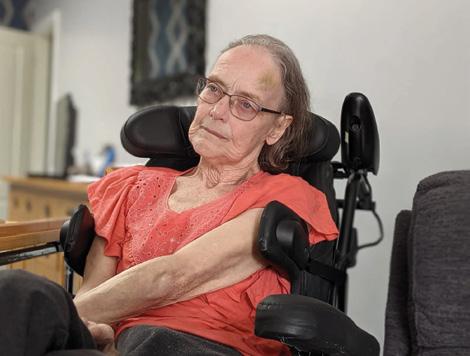
PROSPECT STUDY UNLOCKING SECRETS OF PSP & CBD
Back in 2015, PSPA funded the most ambitious research study in its history. The charity invested £1.3m into the PROSPECT study, which became the flagship project of a newly created Research Network.
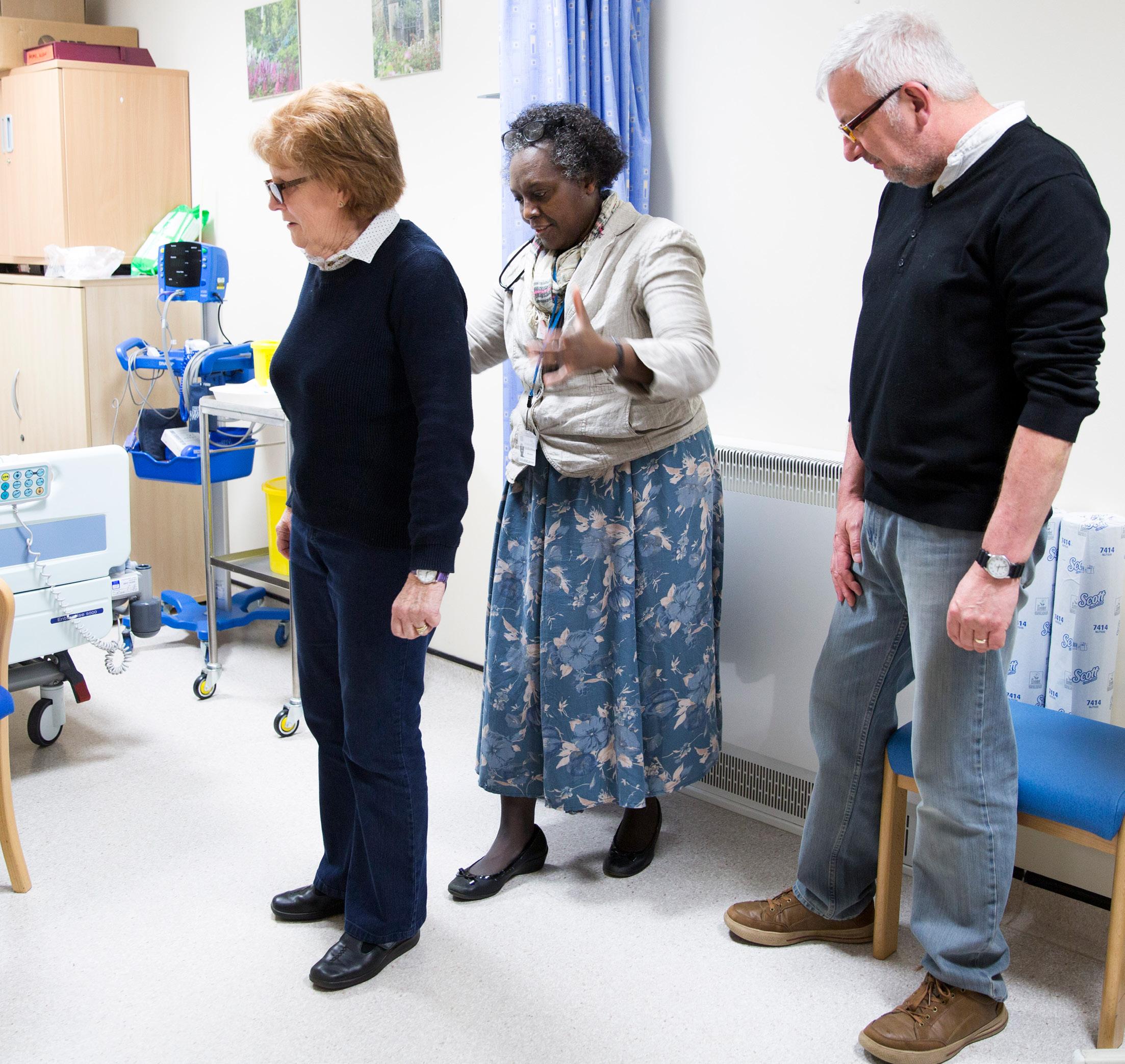
The Research Network was coordinated from the Institute of Neurology at UCL and involves 28 centres all with a strong focus on PSP & CBD research and care. The study brought together leading experts from many areas of biomedical research, including neuroimaging, clinical analysis, pathology and genetics. It allowed the sharing of patient samples and data, helping to foster greater collaboration in PSP & CBD research. This Research Network is just one of the ways that PROSPECT is making a lasting difference to PSP & CBD research.
The PROSPECT study had two arms. One part of the study involved the collection of blood, spinal fluid (from a lumber puncture) brain scans and clinical information from patients over several years, enabling researchers to make new discoveries based on the way that PSP & CBD change over time.
A separate cross-sectional arm of the PROSPECT study collects one-off blood samples, generating a resource for investigating indicators of disease in blood as well as genetic data. Anyone with a diagnosis of PSP or CBD could take part in this arm of the study and can give blood at their local GP surgery.
PROSPECT has created a much needed resource for researchers to help identify therapeutic treatment targets. From this study there is now a bio bank of data, samples and brain images, enabling researchers to better understand disease biology, potential therapeutic targets, genetic determinants and clinical subtypes of atypical parkinsonian disorders.
Marte Theilmann Jensen, a Research Coordinator at UCL who has worked on the PROSPECT study since 2020 said: “In terms of information and data we collect through PROSPECT, we cast the net pretty wide, something you need to do when there is so much that is unknown. We wanted to know everything that affected people with PSP or CBD, their history, where they lived in their life, as well as symptoms of their disease and how it affects them.
“We want to develop an understanding of why a person gets PSP or CBD. We also want to find a way to speed up diagnosis, and of course to develop potential new treatments. The data collected through PROSPECT will greatly help with this.
We’ve learnt a lot since it began in 2015. We know that the prevalence of PSP is greater than we had anticipated. There is more research taking place now than ever before, potentially including new clinical trials. We’re at an exciting stage and I do believe that during my career we will see effective treatments for PSP & CBD.”
As well as building up a body of knowledge and data to help unlock the secrets of PSP & CBD, another important outcome of PROSPECT is that it’s helped to secure further investment. The National Institute for Health and Care Research and the Medical Research Council is investing £14 million into 11 projects that make up the Rare Disease Research UK Platform. As part of this investment, a team comprising Bristol, Cambridge, UCL and Oxford has been awarded a grant to continue the important work of mapping the journey of people with atypical Parkinsonian disorders, which was started by the PROSPECT study, with a focus on improving early diagnosis for patients with PSP, CBS and MSA.
The team at UCL continue to recruit participants for the PROSPECT study as it enters a new phase alongside the ExPRESS study. The Early Assessment, Diagnosis and Treatment of Parkinson’s Plus Related Syndromes (ExPRESS) study aims to have recruited 500 participants by 2028.

“WE WANT TO DEVELOP AN UNDERSTANDING OF WHY A PERSON GETS PSP OR CBD."
“IT WAS CLEAR THERE IS LITTLE KNOWLEDGE OF PSP”
The first time Jayne heard the words ‘PSP’ was when a colleague came into work with a wiki page of PSP symptoms.

JAYNE & SHAUN
By that stage Jayne had already seen a number of specialists over three years of unexplained symptoms, as Jayne’s husband Shaun explains.
Shaun said: “It started in 2019 with balance issues and falls. She was first referred to cardiology. Following cardiology she saw a doctor who thought she might have inner ear problems.
“Next we went to the Nuffield where we saw a couple of Neurologists. The first Neurologist dismissed Jayne’s symptoms as all in her head. We then went to see a different Neurologist who was recommended to us. He suggested it was idiopathic drop attack, but that didn’t explain her other symptoms.
“By this time Jayne’s progression of PSP had worsened and she’d started to have the backwards falls. It was 2022, and that’s when a colleague came to work one day with a wiki print out. As we read out the symptoms we were ticking them off one-by-one.
“We saw another Neurologist and asked if it could be PSP. He referred Jayne to a Movement Disorder Specialist. The Movement Disorder Specialist did
some tests and diagnosed PSP at the end of the appointment. By this point it was March 2023, four years after we first noticed symptoms.
“Once the diagnosis was made, all the support kicked in. Suddenly we were no longer on our own. We had a multidisciplinary team, a blue badge, and numerous hospital appointments. The Neurologist who made the diagnosis referred us to PSPA and asked if we’d be interested in taking part in the PROSPECT study.
“After four years of misdiagnosis it was clear there was a lack of knowledge about PSP. We were keen to help out in any way we could. We agreed and three months later we headed to Queen Square in London.
“We spent a day at the hospital where we were looked after really well. They did tests on both of us to establish a baseline. They told us that Jayne had PSP with a Parkinson variant. Jayne had a lumbar puncture and we both gave blood and did cognitive tests. They also took videos and recordings of Jayne’s movement and vision.
“A year later we went back to London for our second visit. They repeated the tests with Jayne. It was a shorter appointment because they didn’t need to go into medical history and I didn’t need to do any tests. I shared with them copies of medical correspondence to give them a picture of Jayne’s progression and care since the last appointment.
“The test I was most concerned about for Jayne was the lumbar puncture. I was worried about what it would be like and if she’d be able to manage the journey home on the train. The researchers assured us it would be fine but also reminded us that there was no pressure to do it. I asked how important it was and they said it was like liquid gold. That it was the closest you can get to the brain.
“Straightaway Jayne said she wanted to do it. We’d been through such a lengthy diagnosis and she said that if it would help identify biomarkers that may save people in the future from what we went through it would be worth it. So much has been taken from Jayne. Getting involved in research is one thing she can do to feel helpful to others.”
Jayne said: “I was keen to get involved in research because I want to help people in my position. If we can help researchers better understand PSP then it will help them find a cure for it.”
PROSPECT STUDY OUTCOMES
1,594
People participated in the study
209 donated spinal fluid
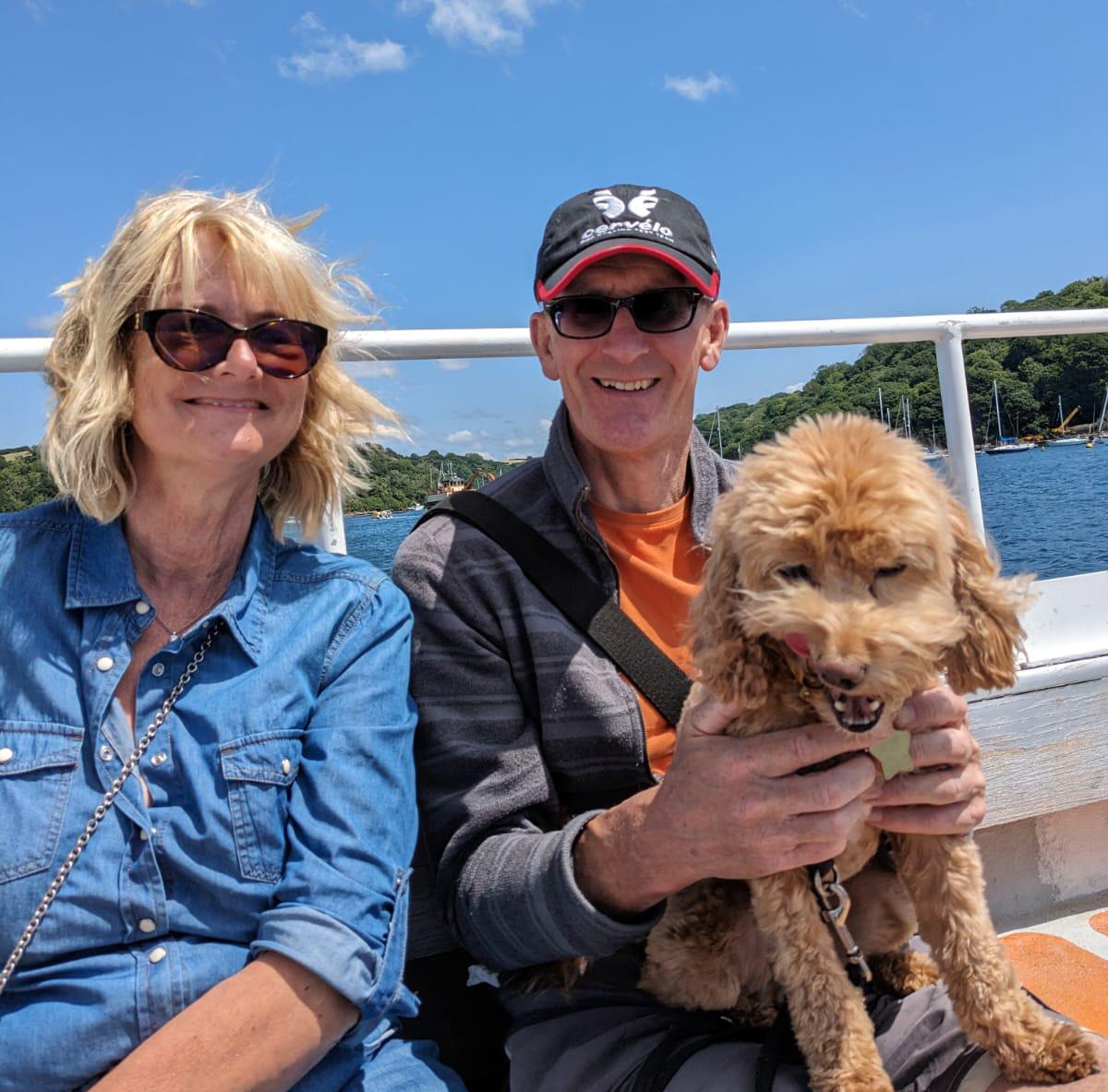
“ONCE THE DIAGNOSIS WAS MADE, ALL THE SUPPORT KICKED IN. SUDDENLY WE WERE NO LONGER ON OUR OWN.
61 donated a skin sample
231 had an MRI scan
1,352 donated a blood sample
BRAIN DONATIONS GIVE
RESEARCHERS A
VITAL
INSIGHT INTO PSP & CBD
Brain banks have greatly contributed to scientific discoveries and breakthroughs in recent years, serving as a vital resource for researchers seeking to better understand PSP & CBD.
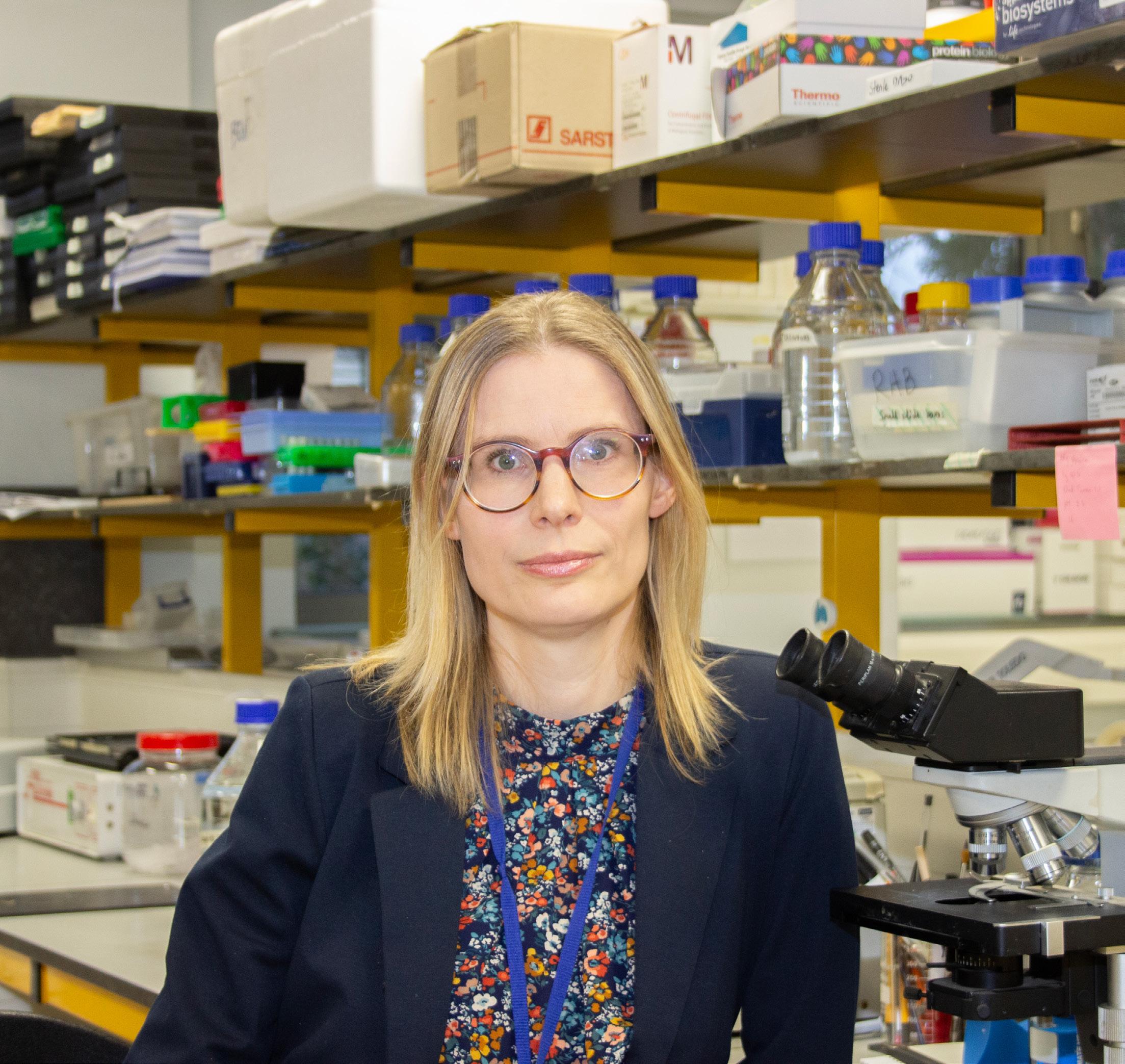
“WE ARE VERY FORTUNATE THAT MORE AND MORE PATIENTS GET INVOLVED IN RESEARCH AND ARE CHOOSING TO DONATE THEIR BRAINS TO RESEARCH.
DR ANNELIES QUAEGEBEUR
Dr Annelies Quaegebeur leads a research team studying PSP, CBD and related diseases and is also a Neuropathologist and the Research Director of the Cambridge Brain Bank. The Cambridge Brain Bank receives around 50 brains from voluntary donors every year and have hundreds of brains available for researchers studying PSP, CBD and other neurodegenerative diseases.
Annelies said: ‘To understand complex diseases like PSP & CBD, it is essential to examine brain tissue from people who lived with the disease. By studying tissue samples under the microscope, we gain detailed information about which brain processes are affected. I am incredibly grateful to all people living with the disease and their families who choose to donate their brain to research – it is the most generous gift as it will help us discover new and improved approaches for prevention, screening and treatment.”
Lynda Outlaw has recently completed the paperwork to donate her brain to King’s College London. Initially she wanted to donate her entire body to research, but after discussing it with her partner Bruce, she decided to donate her brain.
Bruce said: “Last month we were at a carers meeting where a Funeral Director was talking about things to consider to ensure your wishes are known when you die. Lynda and I shared our funeral wishes and that is when Lynda told me that she wanted to donate her body to science. I felt uncomfortable about it and suggested she donate her brain instead because that will be the bit researchers will be most interested in.
“I contacted PSPA and spoke to Debra on the Helpline. Debra provided me with a list of Brain Banks and I contacted King’s College London who take brains from all over the country. King’s sent us some documentation and we went from there. Lynda spoke to her son and daughter about it so everyone in the family is aware.”
By looking at the brain, researchers are able to confirm the diagnosis of PSP or CBD, as well as learn more about the conditions. Annelies said: “As a Neuropathologist I’m responsible for making a diagnosis on the brain tissue coming from a patient with a neurological disease, by examining the tissue under the microscope. Many diseases such as PSP and especially CBD can only be diagnosed with certainty under the microscope.
“A lot of what we know about how the brain works has come from animal studies and we have learned a great deal so far. We can model certain diseases in laboratory animals; however these models never fully recapitulates the diseases in humans, which tend to be much more complex and affect processes that are unique to people such as thinking. A drug that works in a mouse does not necessarily work in people. As a result, there has been a surge in demand to use human brain tissue samples to identify the processes that play a role in disease. Brain banks like ours are crucial to support this work.
“With our dedicated team at the Cambridge Brain Bank, we work hard to ensure that this precious gift of tissue is preserved and used in the best possible way. The brains are processed in several ways so they can be used in a wide range of research techniques. Half of the brain is preserved in formalin, a solution that preserves biological tissue so they can be handled more easily and stored over a longer term. Researchers from all over the world can request tissue samples from our Brain Bank.
“It is fantastic to see how more and more researchers join forces in finding new ways to understand and treat PSP & CBD. Often, the most progress is made by studying a disease from multiple perspectives.”

LYNDA OUTLAW HAS RECENTLY COMPLETED THE PAPERWORK TO DONATE HER BRAIN TO KING’S COLLEGE LONDON.
LYNDA OUTLAW AT A PSPA EVENT
Annelies’ team uses post-mortem brain tissue to study microglia and synapses in PSP & CBD, investigating how these processes are linked in driving the disease and how findings in tissue compare with tests done during life.
Annelies explained: “Microglia are the brain’s primary immune cells. Their job is to clear away an intruder or infection. However, in chronic diseases like neurodegeneration, animal models show that microglia can become overactive, attacking the nerve connections, or synapses, which leads to the progressive degeneration of nerve cells. It’s critical to study this in human tissue as well, since microglia in humans differ significantly from those in mice.”
Microglia are now considered a very promising target for therapies, but effective treatment requires a deeper understanding of the molecules driving the diverse roles of microglia in disease. Annelies noted: “Microglia are complex cells with many functions. They respond to disease in different ways, and it’s important to discern which responses are beneficial and which might harm the brain. Our research aims to identify the molecular fingerprints of these microglia using advanced technologies on brain tissue from PSP & CBD donors.”
Annelies and her team are also studying tissue to validate tests that are done during life in people with
PSP & CBD, to measure inflammation and synapses. Annelies said: “For synapses and inflammation to be viable targets in clinical trials, we need ways to monitor them in living people. Special scans and blood tests have been developed but we need a better understanding of what these tests reflect.
“We are measuring in detail the loss of synapses and overactive immune cells in the brain tissue donated by volunteers with PSP who underwent special scans during life to measure synapses and inflammation respectively. We work closely with clinical researchers to compare our tissue findings with the results of the tests during life. The good news is that these studies are progressing well, and will help us understand how these scans can be used to test new treatments.
“We are very fortunate that more and more patients get involved in research and are choosing to donate their brains to research. Increasingly, we are receiving brain donations from patients treated throughout their disease progression at clinics in Cambridge, including those who participated in studies. This allows us to correlate what we observe in tissue samples with clinical data, including blood samples and brain scans taken while they were alive. This integration provides a much fuller picture of the disease in each individual, combining detailed tissue analysis with measures of disease during life.”
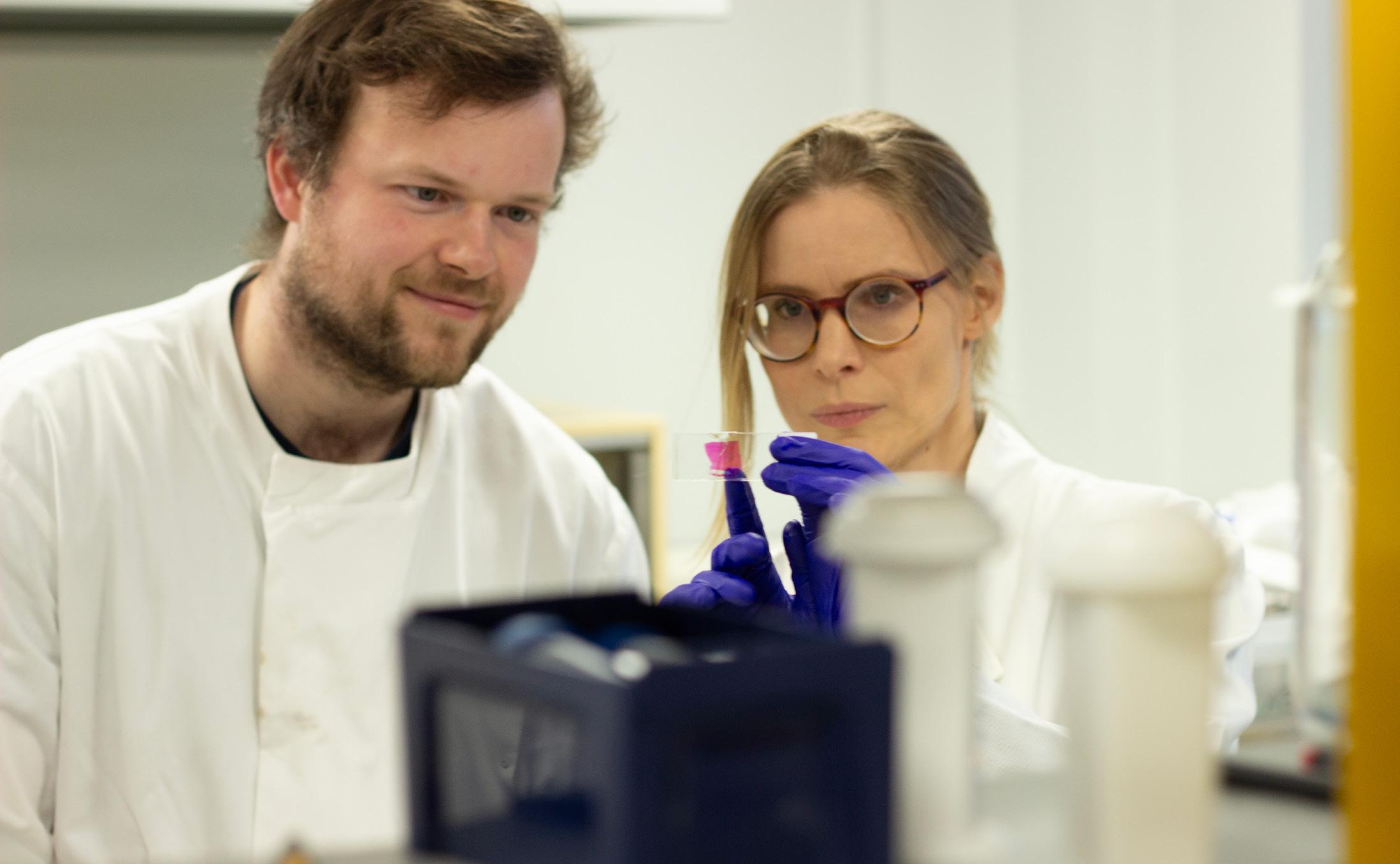
DR ANNELIES QUAEGEBEUR WITH ONE OF HER TEAM
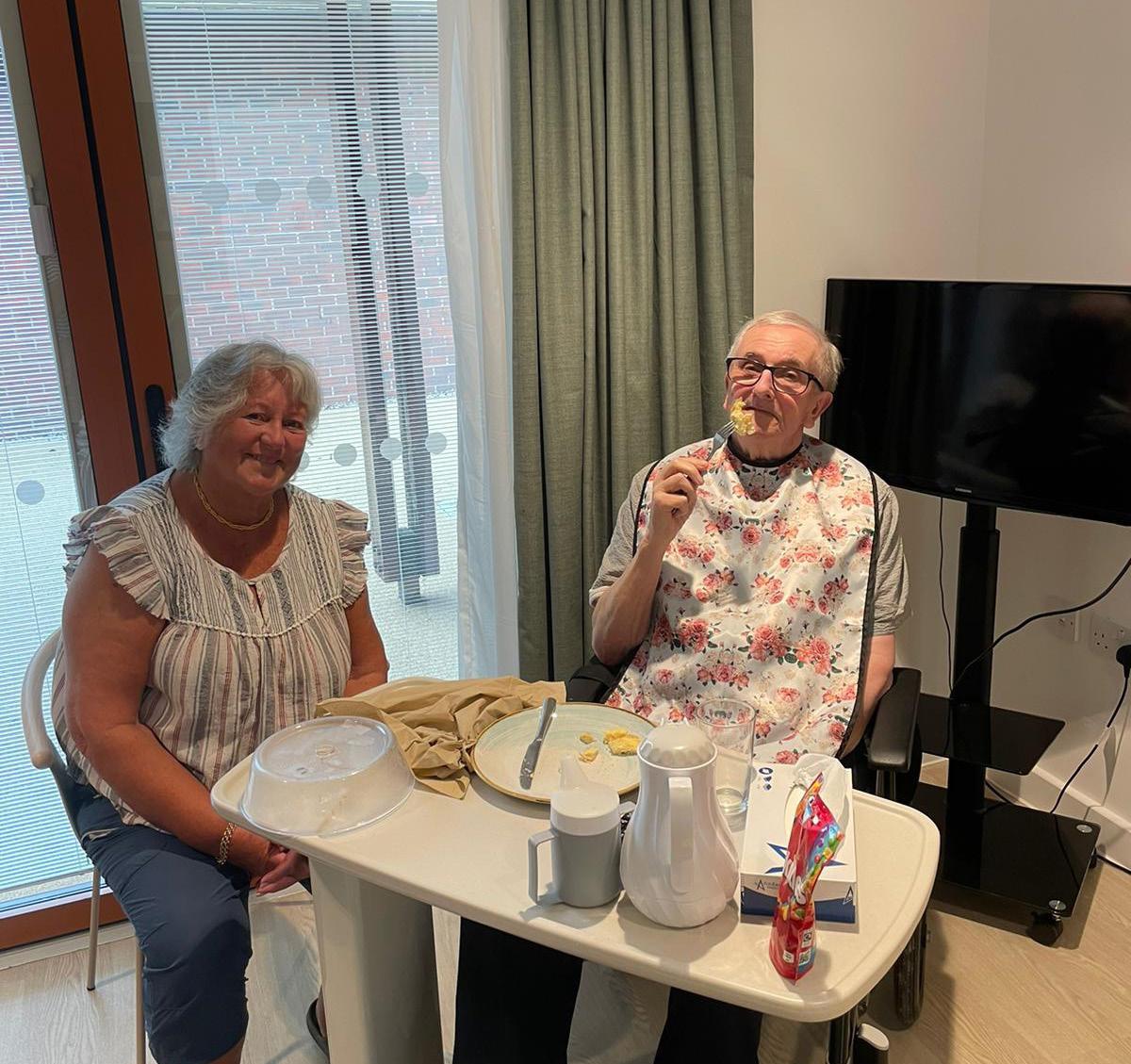
For Katie Taylor her dad’s decision to donate his brain has given the family something positive to focus on following his death from PSP. Peter had lived with the condition for around four years, but the family believe it was longer but they weren’t aware of PSP. He was cared for at home by his wife Pat until the very end.
Katie said: “Dad was a fit and active man. He always wanted to help others, so it feels fitting that his final act was something that would benefit people living with PSP. When Dad was diagnosed with PSP I read about brain donation. As a family we discussed it. It was a difficult subject to approach, but Dad said, ‘if this will help someone else going through this, then I would want to help them in any way I can’.
“After Dad died I contacted the brain bank nearest to us. Phil, the Brain Bank Coordinator dealt with everything in such a calm yet efficient manner, taking some of the pressure off me. He arranged everything with the Funeral Directors. It all had to be completed within seven days so it felt like a bit of a rush. I’d advise anyone considering brain donation to complete the paperwork prior to death to make things a little easier.
“The Funeral Directors took Dad to our nearest hospital where he had the procedure. It was fairly quick and within an hour he was back at the funeral home.
After Dad’s funeral, Phil called to explain how Dad’s brain would be used in the research they’re doing in Manchester. He also shared how researchers all over
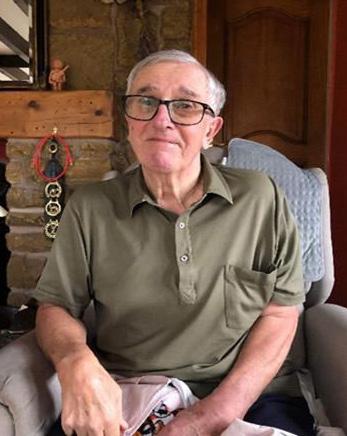
the world could request samples of brain meaning some could end up in Japan or USA – I think Dad would be really proud of that.
“Dad suffered a lot during his illness. Having donated his brain has helped us all as a family, that he didn’t suffer in vain. That it was to help others. It’s given us something positive to focus on.”
Bruce and Lynda also see the donation as a way to do something positive. Bruce said: “It’s hard to see Lynda deteriorate with PSP. She was always so active and lively. We met after we were both widowed. We have a background of loss and have always focused on doing something positive. For many years we were active fundraisers for a blood cancer charity. For Lynda, donating her brain represents another positive action taken in the face of loss. We are all very proud of her.”
If you decide to donate your brain tissue for use in research, it’s best to ensure that your wishes are known to your family and others involved in your care.
Please visit www.pspassociation.org.uk and search for brain donation or call our Helpline on 0300 0110 122.
KATIE'S PARENTS - PETER AND PAT
DAY IN THE LIFE OF A CLINICAL RESEARCH FELLOW
Dr David Vaughan is a Clinical Research Fellow at UCL where he specialises in atypical parkinsonian disorders and neurogenetics and works on the PSPA funded PROSPECT study.

David is currently looking into biomarkers of PSP and corticobasal syndrome (CBS), predictors of disease progression in PSP & CBS and genetic risk in atypical parkinsonism. Here, he takes us through a day in his life and shares how he balances his clinical work with his research.
“Before starting my fellowship, my exposure to research was minimal. Now, as a Clinical Research Fellow, my work is split between clinical work and research. I’ve come to love the research part of my work. I feel I get the best of both worlds where I can see scientific discoveries applied to patients.
“My typical week is a mix of seeing patients, coding and analysing data, lab work, supporting clinical trials, and working on the PROSPECT study. There’s also the occasional conference or scientific event where I can share my own research and hear about the research of others.
“Monday is clinic day where Professor Morris and I see patients with Parkinson’s disease and atypical parkinsonian disorders. We always start the day with a meeting with the wider research team.
“After the research meeting Professor Morris and I look through the clinic list together, noting how many patients are new and how many are return appointments. We make a plan on the patients’ management and divide the list between us.
“After lunch patients start to arrive. We have 11 booked in today. Some of these will be receiving a first diagnosis. By the time PSP patients come to us they’ve usually been told that it may be PSP but we do have some who are hearing it for the first time, and that can understandably be difficult for them.
DAVID VAUGHAN
“A lady in her mid 60s arrives with her husband. This is her first appointment, so I take a detailed medical history and talk her through the tests. She shares with me how she had retired a few years ago and had been looking forward to travelling and spending time with her grandchildren. A future that was greatly changed by the first onset of symptoms over three years ago. She was initially diagnosed with Parkinson’s but has been referred to us because her later symptoms do not fit the diagnosis.
“I perform a neurological examination using the rating scale. I may then refer for blood tests. As I observe the patient, I’m pretty convinced she has PSP. Her symptoms are textbook, with the restricted eye movements and backwards falls. I share this news with her. She is upset but says she is glad she finally knows what it is. We discuss support and advice available from PSPA.
“I find my work with patients very rewarding. I’m always touched by support they get from their family and how their partners so ably take on a caring role. While I only do one clinic a week, I do also see patients with PSP & CBS every week for the PROSPECT study.
“I’ve spent two years working on PROSPECT doing clinical examinations on study participants. Some of them have travelled a long way to participate in the study. It always resonates with me that despite having so much to contend with, they are so determined to help others and to volunteer for research.
“I’d perform a detailed neurological assessment, including rating scales and take blood tests that will be used for genetic testing and biomarker analysis. My colleagues then perform cognitive testing. Some patients also volunteer to have spinal fluid collected through a lumbar puncture. We are in the final stages of the study and are now looking at the huge amount of data we’ve collected from patients, to find genetic variations to discover biomarkers that can aid diagnosis.
“We are also recruiting patients for the cross-sectional part of PROSPECT. This is where we will collect one-off blood samples to create a resource for investigating indicators of disease in blood as well as genetic data. Anyone with PSP or CBD can take part in this part of the study by simply having their blood taken at their local GP surgery.
“We are starting to recruit patients for the ExPRESS study – this is to help improve early assessment and diagnosis. To participate in this study participants will need to be newly identified as having some form of parkinsonism, so that we can catch their earlier symptoms.
“My next patient is a lovely man in his early 70s who I diagnosed with PSP over a year ago. He has progressed quite a bit since then. What strikes me is how funny and positive he is. They’re clearly a close family and are determined to find something positive to focus on. We talk about his progression and discuss some interventions that may help him manage his symptoms.
“Clinic days are very busy. Tomorrow will be a quieter day when I’ll be in the lab analysing blood and spinal fluid samples. The majority of my lab work is spent looking at DNA samples. I take a very small sample and use a NanoDrop machine to measure the concentration of DNA in my sample, because different tests require different quantities of DNA.
“Knowledge of the conditions has accelerated over the past few years and there is now a particular focus on the underlying pathology. We are learning more about genetic variations and how that affects the disease.
“I’m just finishing off a paper we are submitting for publication where we looked at the gene C9orf72 to see if there is an impact on the rate of progression of PSP and if it affects age of disease onset. There is a lot of interest in therapies for neuro degenerative diseases that target specific genes, and much of this is focussed on C9orf72, since the discovery that repeat expansions in this gene are a common genetic cause of amyotrophic lateral sclerosis (ALS) and frontotemporal dementia (FTD). Through PROSPECT we have around 550 samples of people with PSP & CBS and around 100 healthy controls, so we are attempting to replicate this to see the impact of the gene in people with PSP & CBS.
“After that I’ll then spend the next couple of days in the office, analysing the data and continuing to work on some research papers. It’s important we share our findings as quickly as possible so that other researchers can build on our work. PSP & CBS are far too big for one research team or one laboratory. It will take a collective effort to end these diseases, so we need to ensure information is shared and that the PSP & CBS research community collaborate freely.”
CBD FACT
CBD is a pathology, the thing that is causing the disease in the brain. CBS is a syndrome which is a collection of symptoms. CBD in the brain can show as different diseases in life, but most people diagnosed with CBS have CBD causing it, which is why they are used interchangeably.
“GETTING INVOLVED IN RESEARCH IS OUR WAY OF DOING SOMETHING POSITIVE”
Research can only happen if people living with the condition are willing to take part. From large scale studies to smaller ones, many people with PSP & CBD are participating in studies to help researchers build up a clear picture of both diseases.

DAVID AND MARCIA WRIGHT
For David and Marcia Wright, getting involved in research studies was a way to help other people, as well as providing access to specialists in PSP. David cares for his wife Marcia since her diagnosis of ‘probable PSP’ in 2023, however Marcia first noticed something was wrong in 2020. It started with unexplained falls along with what she described as ‘a sense of being removed from reality’ as well as speech difficulties. A neuropsychological assessment in 2021 gave the first indication that she had PSP.
Last year, the couple were watching the news when there was an item about a Parkinson’s research study University of Exeter was conducting. David explains: “Both Marcia and I thought it looked interesting so I contacted Marcia’s Neurologist about it. He said he thought it was for conventional Parkinson’s and that Marcia wouldn’t fit the criteria. Undeterred, I contacted the University. A few days later we received a reply that Marcia wasn’t eligible. I called them to find out why and I’m so glad I did. The research coordinator at the University explained why Marcia wasn’t right for the study we’d seen on the news, but then went on to tell me about a PSP study they were about to start recruiting for.”
The study David discovered is run by the Neurodegeneration Imaging Group (NIG) at the University of Exeter. The project aims to investigate how tau spreads in the brain and why it affects people differently. Researchers are hoping that by using these advanced brain scans and blood tests, it will be easier to distinguish between other similar conditions like Multiple System Atrophy (MSA). The scan uses a small radioactive tracer that is injected into the body and binds to the tau, which then lights up on the scan and shows where the tau build up is. The study is being conducted at Imperial College London.
Hearing about the study Marcia decided to volunteer as a participant. David said: “Taking part in the study gave Marcia an opportunity to be seen by specialists in PSP. It also feels good to do something positive. Receiving a diagnosis of PSP can feel quite bleak and isolating. There are no effective treatments, so for us, getting involved in research is a way of focusing on something positive. We dearly hope it may lead to an effective treatment that can slow Marcia’s progression. Even if it doesn’t directly benefit Marcia, hopefully it will benefit others diagnosed in the future.”
In August Marcia and David made their way to Imperial College in London so that researchers could do a number of baseline tests on Marcia. David continues: “We are fortunate that we are both still quite mobile so we’re able to travel easily. Testing was carried out over
two days. On the first day Marcia was assessed and then she did multiple blood tests. We received some of the results of the blood tests while we were at Imperial. Interestingly one of the results showed that she didn’t need to take statins so was taken off it.
“For the second day Marcia was put in two different scanners. The first was a high definition scanner that looks at the neural pathways in the brain and the second scanner was a PET scanner. This one required Marcia to take an intravenous marker that showed up areas in the brain. She was in that scanner for a couple of hours. The whole process was very organised and we were well looked after. Hotels, trains and taxis were all booked and arranged for us.
“We will need to return to Imperial College so that the tests can be repeated. This is how researchers are able to track the effects of PSP on the brain and body. Marcia has also volunteered to be part of the PROSPECT study. She is very committed to being involved in research, so in December we will once again be travelling to London, but this time to UCL where the study is being conducted.
“I’m proud of Marcia volunteering in this way. Life has changed hugely since Marcia received the PSP diagnosis. We love to travel and spend time outdoors. Sadly that is starting to become harder and harder, but we are determined to do whatever we can to live positively with PSP.”
WOULD YOU LIKE TO GET INVOLVED IN RESEARCH?
Research can take place in many different locations including GP practices and even from the comfort of your own home depending on the study. If you are interested in finding out about research projects that are recruiting sign up to our research register or contact our Research Coordinator Megan Hodgson by emailing research@pspassociation.org.uk
SCAN THE QR CODE TO EXPRESS YOUR INTEREST
OUR POLICY AND INFLUENCING WORK IN 2025
Mark Jackson, PSPA's Director of Policy and Influencing, shares the charity’s plans for the coming year, focusing on raising awareness, improving evidence, and ensuring the voices of those affected by PSP & CBD are heard.

As we look forward to 2025, our focus remains on making the voices of those affected by PSP & CBD heard in the debates that matter to you, while working with policymakers, the healthcare sector and media to drive meaningful change.
Firstly, I want to thank everybody who completed My Neuro Survey. The survey is the largest source of patient experience data for neurological conditions in the UK and, along with our partners at the Neurological Alliance, we will use the insights gained from the experiences you shared with us to inform our campaigning to improve diagnosis, speed up access to services and end postcode lotteries across the country.
One of our key objectives for 2025 will be building on the data from My Neuro Survey to further improve the evidence base on PSP & CBD and how the conditions affect people living with them. Ensuring we have the best possible evidence on the conditions, and that we can make that evidence available to decision-makers, is critical.
When I visit Support Groups and talk to the community, time and again I hear that people are frustrated by care that is hard to access, slow to receive and where the different services aren’t joined up.
We’ve already started gathering information on the experiences of people living with PSP & CBD with NHS Continuing Healthcare, to understand why this service – which should be delivering coordinated and personcentred care – isn’t working for many of you.
I also hear too often that healthcare professionals simply don’t know enough about the conditions. In 2025, we’ll be undertaking some work to better understand the state of awareness among doctors, nurses, clinicians and other healthcare professionals. This will include where they get their information about rare conditions like PSP & CBD, so we can support professionals better.
Additionally, we will be launching a new version of the PSPA Survey of people living with PSP & CBD, which we last conducted in 2022, providing us with fresh data to better understand your priorities and experiences.
After a successful Awareness Week campaign in 2024 where more than 250 of you wrote to your General Election candidates to raise awareness of PSP & CBD, we’re looking ahead to next year’s campaign and how we can use the platform to continue raising awareness of the conditions among healthcare professionals, helping to improve understanding and coordination of care.
We’re also planning to strengthen our presence in Parliament, hosting a drop-in event where MPs can learn about the challenges faced by people living with PSP & CBD, and we’ll keep raising the profile of the conditions whenever the UK or devolved parliaments are debating relevant issues.
Thank you for your ongoing support, which makes this work possible. Together, we’ll continue to push for better care, greater awareness, and lasting change in 2025.
MARK JACKSON
RESEARCH INFORMATION SESSIONS
PSPA’s online research events are a great opportunity for people affected by PSP & CBD to hear directly from researchers about their studies.
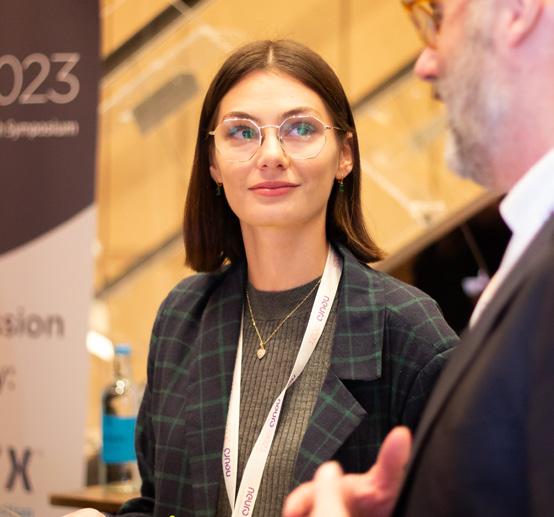

This year, to allow more people to attend, our Research Information Sessions were shorter and held more frequently. The first session held online in May focused on research that improves accuracy and speed of diagnosis.
Dr Maura Malpetti from the University of Cambridge, explained her research which investigates inflammation in the brain and blood tests which can measure this as a potential biomarker. Dr Malpetti was funded by a PSPA small research grant and has recently been awarded a larger sum of money by CurePSP to build on her work.
Professor Dan Smith from Durham University is investigating eye movements and cognition in PSP. He is hoping that a simple paper test carried out in clinic will be able to distinguish between Parkinson's disease and PSP, by tracking the way a patient finds a specific item in a crowded sheet of distractors.
Riona Fumi, the coordinator of PSPA funded PROSPECT shared how a new study, ExPRESS will track people with signs of parkinsonism from first referral to see how many people go on to be diagnosed with PSP or CBD and their earliest symptoms.
Dr Alana Terry from the University of Exeter spoke about their study which looks at molecular imaging of the brain in PSP and how these brain images differ from people with MSA or Parkinson's disease.


Lastly, Dr Edwin Jabbari, a research fellow at UCL (see page 24) spoke about his PSPA funded project which aims to test a diagnostic seed amplification assay as a diagnostic tool for PSP & CBD.
The second session took place in September, this time with a focus on research that aims to improve care and treatment for people with PSP & CBD. The first speaker was PSPA Trustee and research committee member Dr Boyd Ghosh from University Hospital Southampton. His most recent grant from PSPA funds a project which will examine how quality of life is affected by whether you attend a multidisciplinary clinic or not.
The next speaker was PSPA funded research fellow Dr Robert Durcan from the University of Cambridge. He is working on the NORAPS study, which aims to reduce both apathy and impulsivity using a drug which is currently licenced in the UK for ADHD by increasing noradrenaline in the brain.
Professor Chrystina Antoniades explained the Oxquip study and how she was quantifying PSP using different types of digital technology. While Professor Kate Fleming from the University of York spoke about her research into palliative care in MND.
We are currently planning our sessions for 2025. If there are any specific topics you would like to hear about, please send your thoughts to our Research Coordinator at research@pspassociation.org.uk
RIONA FUMI DR ROBERT DURCAN DR MAURA MALPETTI DR BOYD GOSH
UNDERSTOOD IS THAT TOO MUCH TO ASK?
At PSPA we want to unlock understanding of PSP & CBD. That's why we've launched a £2 million research appeal.
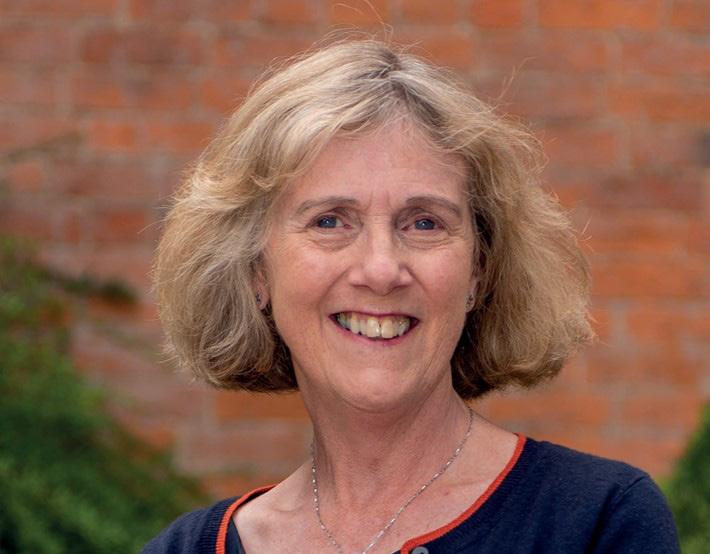

For too long people have had to wait years for a correct diagnosis of PSP or CBD. People have spent years of uncertainty about what is happening to them. For too long people have had to stand by and watch game-changing research breakthroughs happen for other conditions, all the while PSP & CBD remain as mysterious as ever.
PSP & CBD have been hampered by decades of underfunding, large gaps in evidence and knowledge, too few clinical trials and a lack of long-term investment.
We are proud of the research funding we have invested over the last 10 years, but we know we need to do more. That’s why we have launched our new £2 million Research Appeal ‘Understood’ to help us unlock the secrets of PSP & CBD.
The goals of the Research Appeal are:
• Quick and accurate diagnosis
• Immediate treatment
• Consistent care
Ultimately, we want to create greater ‘understanding’ about PSP & CBD, as Jon Garrard PSPA Trustee explains: “We want to make this the most significant appeal so far in the history of PSPA.
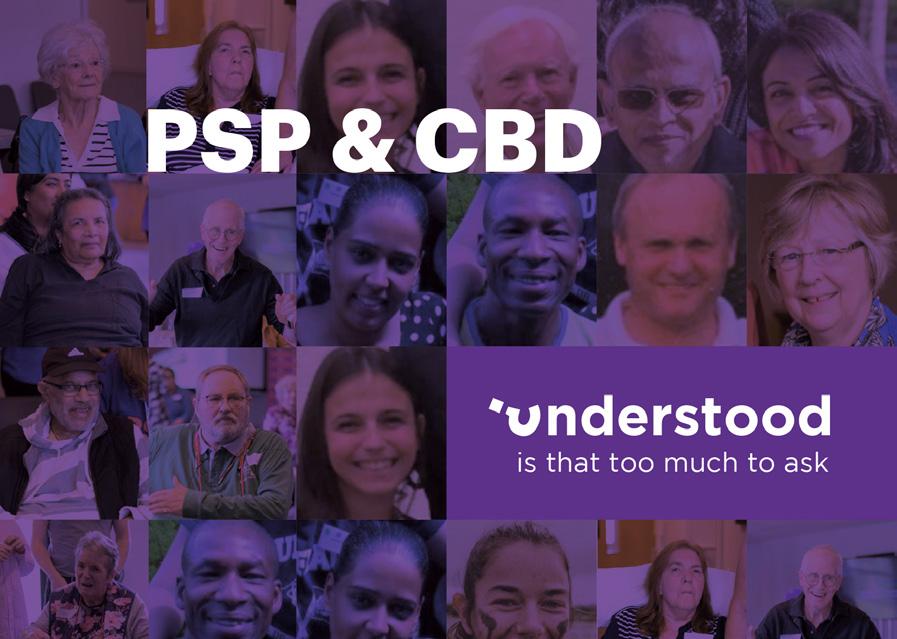
We know huge change needs to happen so we can make an impact on people’s diagnosis experience, the variety of treatments available, and ensuring consistent care across the country.” Jon first got involved with PSPA when his dad Chris was diagnosed with PSP. Chris sadly died in 2016, but the family have remained supporters of PSPA in order to help others affected in Chris’ memory.
Through this appeal we want to harness the strength of our community to push forward research into both conditions. We are working closely with researchers and we are developing a research plan on how the money will be invested. Professor Karen Morrison, Neurologist and Chair of PSPA's Research Committee will oversee the investment. Karen said: “This appeal will help drive forward new approaches to increase our understanding of PSP & CBD. We are at an exciting stage and there is a real sense of hope and anticipation that science will deliver for people with PSP & CBD. There has never been a better time to harness the advances in science, medicine and technology for the benefit of people living with PSP & CBD. We will ensure that good scientific judgement is used and that the money raised is invested in the best quality research."
PROFESSOR KAREN MORRISON
JON GARRARD
PSP & CBD COMMUNITY GETTING BEHIND OUR RESEARCH APPEAL

Linda Lattimer is supporting the Appeal in memory of her dad who died from PSP. Linda said: "I first encountered PSPA in the nineties, after my father had died from the disease. I was so pleased to finally speak to someone who understood and could empathise with the situation. My father had seen numerous doctors and specialists over a period of years and was continuously misdiagnosed.
“PSPA has grown over the past decades into an charity which not only understands the value of research, but also the value of putting that knowledge into the care of patients and families affected by this terrible disease. That’s why I am such a keen supporter. As far as I'm concerned, the most important part of this whole journey is early recognition and diagnosis of PSP.”

Mary, who is living with PSP and her husband John Burnell, are members of the Hampshire Support Group and have chosen to support the Appeal because they urgently want to see change in diagnosis and treatment of PSP & CBD.

Gordons Solicitors is the first company to support the Research Appeal. The solicitors firm is supporting the Appeal in memory of Sara Koe, whose husband Michael founded PSPA. Sara and Michael’s son Digby worked for the firm. James said: "Gordons has supported PSPA since we employed Digby Koe 20 years ago. It is a great charity for a worthwhile cause; providing help and support for those living with a tough, but little known disease. We hope others join us and spread the word.”
We believe we are on the path to making history. Together we stand the best chance of driving forward major research breakthroughs and we really hope that you join us.
There will be lots of ways you can get involved next year. In the meantime, you can join our community fighting for change. Share your experiences and consider opening your networks to any individuals or companies who can help. JOIN US FOR THIS BIG CHALLENGE. TOGETHER WE CAN MAKE A DIFFERENCE
The Understood Appeal will be launching publicly in 2025, alongside The Salt Path Film.
Contact Helen Holman, Appeal Director at helen.holman@pspassociation.org.uk by calling 07753236471 or for more info visit www.pspassociation.org.uk/research/understood/
HOW WE’RE HELPING TO IMPROVE AWARENESS
We know, from your experiences, ensuring more healthcare professionals have heard of PSP & CBD, is important. That’s why we have been busy increasing our support and information for professionals.

As well as tailoring informative guides to specific roles within healthcare, we’ve updated the professional’s section of our website, and introduced ongoing campaigns to aid diagnosis and increase understanding about how the conditions can impact daily life and family carers.
In addition, our Helpline Care Navigators have been visiting Support Groups and clinics to ensure people know PSPA exist and how we can help. They’ve also continued delivering education sessions to teams of healthcare professionals in the community and in hospital settings. With the support of our Education Volunteers, we also deliver information sessions in community groups and for staff working at care and nursing homes.
We’ve been busy developing our annual Study Days for healthcare professionals. We believe we’d support more professionals if we tailored the training to specific roles and symptoms of the conditions. As such, in 2025, we will host four masterclasses, one each quarter. The master classes will focus on
12,164 downloads of PSPA information resources

improving diagnosis by flagging key symptoms which GPs, opticians, physios and memory clinic staff can look out for when reviewing patients.
Following the success of our Awareness Grants in 2023, this year we funded a further project focused on raising awareness of PSP & CBD amongst healthcare professionals.
As well as extending our reach to more healthcare professionals, we know awareness in the public is also important to you. To help with general awareness we work with members of our community, including people living with the conditions, carers, volunteers and fundraisers, to share personal stories of PSP & CBD in the media.
We are proud of the awareness we have improved as part of these activities, but we know our job isn’t done yet. 2025 will be a busy and exciting year with the launch of The Salt Path film. We’re currently preparing plans to make the most of the amazing platform and awareness the film will bring.
1,332 publications sent to health and social care professionals
395 health and social care professionals attended our training and study days
SMALL RESEARCH GRANTS
FUND BIG IDEAS
PSPA’s small research grant programme provides funding for up to £10,000 to PSP & CBD researchers. To apply, researchers submit their application to PSPA detailing their research and how it will make a difference to people with PSP & CBD.
Grant applications are reviewed anonymously by the research committee and our PRIM group (see page 30) before being awarded the funding by our Board of Trustees.
£30,000 will be awarded to researchers from across the UK for studies due to start in 2025.
Funding awarded in previous grant rounds are supporting a range of studies from assessing the benefits of a multidisciplinary team to learning more about the role of brain cells as a potential new target for therapies.
Learn more about these studies below.
Examining the benefits of a multidisciplinary team on people with PSP & CBD
Dr Boyd Ghosh is leading a small pilot study to assess the benefits of specialist multidisciplinary team (MDT) support within a specialist clinic for patients with PSP & CBD. This funding has helped Dr Ghosh to secure a larger grant to continue this work, a project called QOLAPS. This project is currently looking for participants who do not receive care from a multidisciplinary clinic.
Are feeding tubes beneficial for people with PSP & CBD
Dr Ghosh’s second small grant is funding research investigating if feeding tubes are beneficial for people with PSP & CBD. The findings will inform better guidance for Neurologists and could improve access to this intervention if it is found to be beneficial.
Examining the role of microglia
Dr Annalies Quaegebeur, Head of Research at the Cambridge Brain Bank, (see page 10) is using tissue from donated brains to examine the role of brain cells called microglia, a type of immune cell.
Using high-spec spatial proteomics they will characterize different types of microglia, and their aim is to identify targets for immune modulation as a new treatment strategy for PSP.
Specialist
blood tests measure inflammation
Dr Maura Malpetti research aimed to validate specialised blood tests that measure inflammation for more accurate prognosis of PSP & CBD. The project also aimed to identify inflammation-related targets for novel disease modifying therapies which could slow or prevent disease. A recently published research paper from this study showed that higher inflammation levels in the brain were positively associated with worse survival outcomes and higher levels of microglia activation.
New technology to study the brain stem
Dr Mansoureh Hnazaee is investigating a new noninvasive piece of technology called optically pumped magnetoencephalography (OP-MEG)’s potential to study the brain stem. The small grant is funding her to study this in two healthy individuals before building a framework to use this new tech to study in PSP, MSA and Parkinson’s disease, to investigate if OP-MEG complements current methods for improved early diagnosis.
Why tau becomes toxic to cells?
Dr Patrick Cullinane is looking at how tau is modified pre-folding that may contribute to abnormal folding/ clumping by using new nanopore technology. The data will help improve understanding of why tau may misfold and become toxic to cells but will also inform the development of biological markers that can be detected in the early stages, improving diagnosis.
SPOTLIGHT ON DR EDWIN JABBARI
PSPA is committed to nurturing emerging talent and supporting early career researchers and clinicians, to attract them to dedicate their careers to the field of PSP & CBD research.
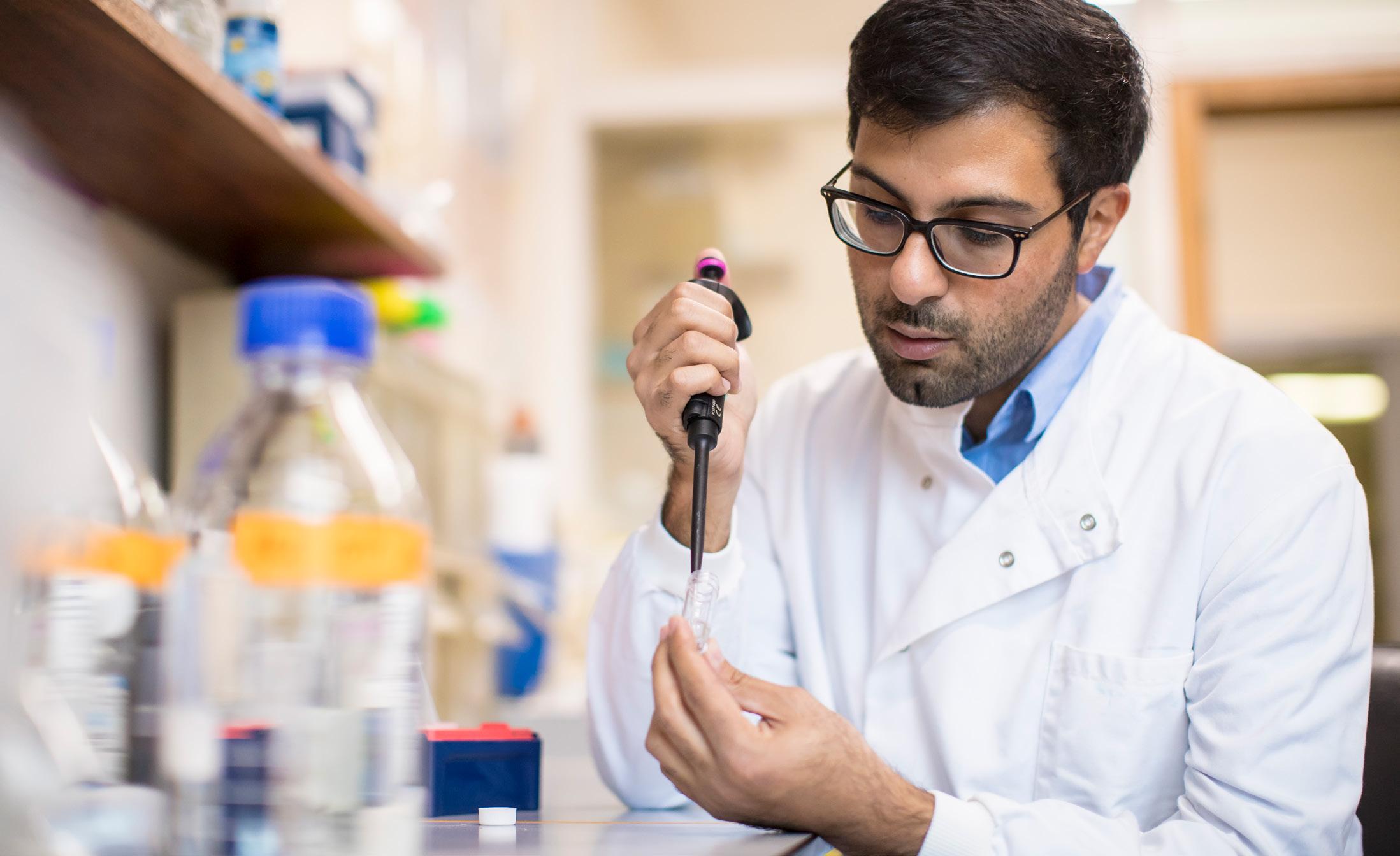
"IN PSP TRIALS WE ARE DELIVERING DRUGS TO PATIENTS WHO ARE QUITE ADVANCED WITH THE CONDITION."
Dr Edwin Jabbari is a Neurology Registrar at the National Hospital for Neurology and Neurosurgery and a Clinical Researcher at the UCL Queen Square Institute of Neurology. Ed was funded by PSPA at the start of his research career in 2016, when he was awarded the Sara Koe Fellowship. Since then he has worked on a number of studies, including his most recent one that has the potential to revolutionise the diagnosis of PSP & CBD.
Ed said: “Back in 2016 when I started my PhD under the supervision of Professor Huw Morris at UCL, my main focus was on improving our understanding of the different ways that PSP can present clinically. For many years we thought PSP was one disease, where
patients typically presented with balance problems, falls and problems with speech and swallowing. But the PROSPECT study actually showed a wide spectrum of how PSP patients can present, with some looking like Parkinson’s disease whereas others looked more like frontotemporal dementia.
“I focused my PhD on trying to establish if there were biological reasons why patients look different and also why they progress at different rates. We leveraged the power of genetics to look into the reasons why those differences occur in PSP. The main findings from those genetics studies is that we discovered two genes involved in different forms of PSP.
DR EDWIN JABBARI
“TRIM11 is a gene related to the ubiquitin proteasome system – the cell’s waste disposal system, so it’s how we get rid of unwanted proteins. TRIM11 has been implicated in other neurodegenerative diseases, but this was the first time we had a link with PSP.
“We also found that a gene called LRRK2 was associated with rate of progression. LRRK2 is a gene that has a well-established link with Parkinson’s so it was interesting that it appeared to be involved in the rate of progression in PSP.
“More recently as a post-doctoral researcher my research has focused on two areas. The first was to continue to investigate the LRRK2 gene to measure the amount of LRRK2 activity to see if it is raised in people with PSP compared to healthy controls. This was to determine if lowering the amount of LRRK2 activity might be a promising treatment approach. This study was done in collaboration with world leading experts in LRRK2 biology at the University of Dundee. The data from this study has just come back and we will be looking to publish the findings by the end of the year.
“The second area of my work was funded by a grant from PSPA. I started it in February and we’ve made huge progress in a short space of time. We know diagnosing PSP is challenging. There’s a lot of clinical overlap with Parkinson’s and the two conditions look very similar, particularly in the early stages. This makes it incredibly difficult to make an early and accurate diagnosis.
“Patients are left with years of uncertainty. This late diagnosis also has an impact on clinical trials. In PSP trials we are delivering drugs to patients who are quite advanced with the condition, whereas promising results we’ve seen in other conditions like Alzheimer’s, have all been when drugs have been delivered early on in the disease. So finding a way to make an accurate diagnosis earlier will help end years of uncertainty for patients, but it will also help improve the effectiveness of clinical trials.
“In Parkinson’s disease we’ve seen the exciting development of Alpha-synuclein seed amplification assays. These are tests that can identify people with Parkinson’s disease during the early stages or even before symptoms begin. The tests detect the presence of abnormally misfolded proteins, so in Parkinson’s the protein of interest is Alpha synuclein, whereas in PSP it’s tau. We all have these proteins in our brains but in people with Parkinson’s or PSP they become sticky and clump together. This leads to a wearing down of brain cells eventually leading to the symptoms of these conditions.
“The seed amplification assay has been a gamechanger for how we diagnose Parkinson’s, so we wanted to apply the same techniques to see if we could develop a tau seed amplification assay to aid in the diagnosis of PSP & CBD. In developing this I travelled to the USA to work with experts in the development of these assays.
“We’ve had some really promising results so far. We found when we apply tau assay to brain tissue samples from deceased patients it reliably differentiates PSP from other neurodegenerative disorders and healthy controls. Like the other study, we should be in a position to publish these results at the end of the year.
“The concept should be applicable to CBD, as like PSP it’s also caused by a build-up of this abnormal misfolded tau protein. So the tests should be able to pick up the same abnormal protein in the patient samples, but for now the focus is on PSP patient samples. Once we have obtained further funding we will test this on a larger cohort of CBD and CBS samples.
“I believe this could be a huge step forward to be able to have a test to support diagnosis in the early stages of the condition. Our next step is to make this test work when applied to spinal fluid samples from living patients and then eventually a blood-based test, as blood is more accessible than spinal fluid.
“This test will not replace a clinical assessment, rather it will form part of a battery of tests and assessments to aid clinicians when making a diagnosis, particularly in tricky situations where there is a lot of clinical overlap between PSP and Parkinson’s.
“PSPA funding has been critical in helping us get to this point. It gave me the opportunity to learn the technique of seed amplification assay and to work with the researchers in the USA to develop this for the tau protein. I hope that in a couple of years this test will be used in clinical practice.”
“I BELIEVE THIS COULD BE A HUGE STEP FORWARD TO BE ABLE TO HAVE A TEST TO SUPPORT DIAGNOSIS IN THE EARLY STAGES OF THE CONDITION."
YOUR 30TH ANNIVERSARY AWARD WINNERS
AWARDS

PSPA’s 30th Anniversary Awards were launched this year to help mark the charity’s milestone year and thank members of the PSP & CBD community for their support. Here are details of the six award winners.
ALWAYS AMAZING AWARD FOR SOMEONE LIVING WITH CBD WINNER: RUTH TILLARD
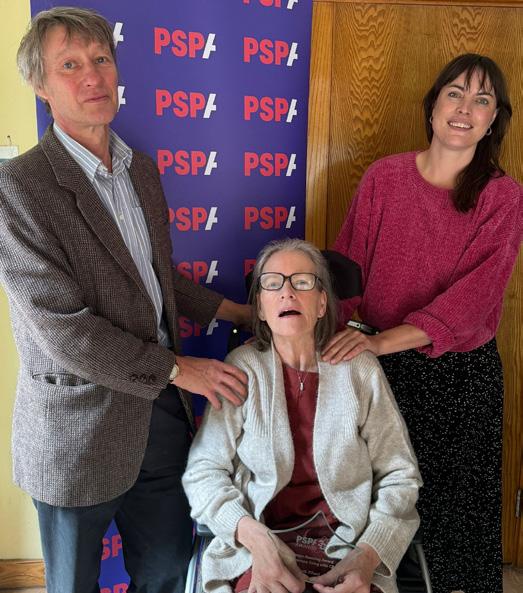
Ruth won this award for the commitment she has shown to living life to its fullest since her diagnosis of CBD. Ruth’s nomination, detailed many family adventures, fundraising challenges and encouragement to others to support PSPA.
Ruth was presented with her award at the Kent Support Group meeting, which she attended with her husband Richard and daughter Roxy. Richard said: “Throughout her illness, Ruth has rarely complained, and she has kept up a positive outlook despite her decline. This has allowed the children to come to terms with her diagnosis and motivated her to go out and raise money for PSPA.
“It was lovely to attend the Kent PSPA Support Group to receive the award. It was the first time since the pandemic that we had been in person with other families affected by PSP & CBD, who we want to thank for their hospitality and making us feel so welcome.”
FUNDRAISING AWARD WINNER: STEVE WATSON

PSPA supporters do lots of amazing things to help raise vital funds and awareness of the charity. Standing out amongst the Fundraising Award nominees is Steve Watson.
In April this year, Steve completed his sixth London Marathon for PSPA. Steve chose to run the six marathons to represent the six years his mum lived with PSP, raising more than £15,000. He also helped PSPA to establish the Business Networking Group and regularly encourages family and friends to support the charity too.
After receiving the award at the Stockport and Cheshire Support Group, Steve said: “I am delighted and very grateful to receive this lovely gesture as part of the 30 years of PSPA. In tribute to my Mum, who battled PSP for six years, I have found raising funds and awareness to be a source of comfort and I am determined to continue supporting PSPA and their excellent work until a cure for this horrible disease is found.”
CARING AWARD
WINNER:
JUDITH HAMILTON

The Caring Award was the most popular award this year, with more than 20 nominations. Judith Hamilton was selected as the winner of the award. She was nominated by her sisterin-law Catherine, who wanted Judith’s care for her mother Elsie recognised.
Sandra Campbell from Northern Ireland’s Rare Disease Partnership helped PSPA to present the award to Judith. Judith said: “I was delighted and surprised to receive a call from PSPA informing me I had won the Caring Award as part of the charity’s 30th Anniversary celebrations.
“I had been kindly nominated by my sister-In-law Catherine, for the care of my mother-in-law Elsie. Elsie was diagnosed with PSP over seven years ago and as time has passed it has been a pleasure to assist Elsie with her care especially in the past three years.
“A special thank you to Sandra Campbell who travelled to Elsie’s home to meet our family and present the award."
ALWAYS AMAZING AWARD FOR SOMEONE LIVING WITH PSP WINNER:
PATRISHA DAVID

Patrisha received two nominations for the Always Amazing Award for someone living with PSP; one from her niece Sarah-Jane and one from the clinician who treats her, Dr Martina McCarthy. Patrisha was nominated for her determination to bring change to her community and for the support she has provided to others, by sharing her experiences of living with PSP for a book penned by Dr McCarthy. Patrisha said: “Receiving my award was a milestone for me. Even though I live with a challenging condition, my life is enriched with so much love and support to get me through the tough times. This award reminded me of how amazing all the people are around me that lift me up to live a good and happy life with PSP.
IN-MEMORY AWARD
WINNER: CHRISTINE HARRISON
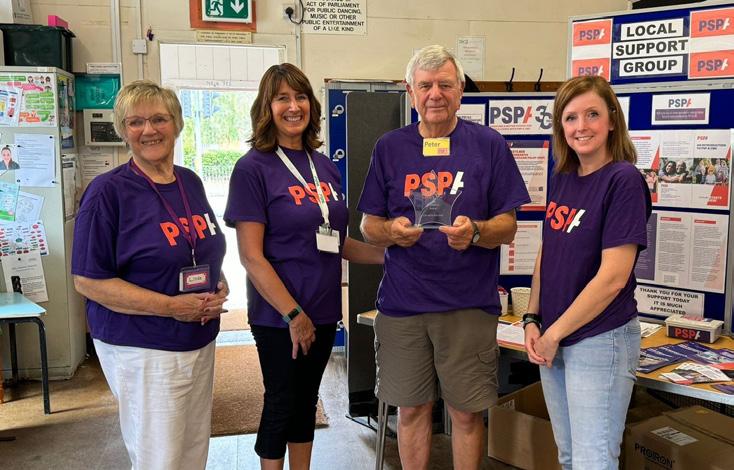
Nominated by her husband, Peter, Christine was selected as the winner for the dedication she showed to inspiring others and raising
funds with her handcycle challenge. Peter regarded his nomination as ‘continuing her legacy’.
Peter was presented with the award in Christine’s name at the Norwich Support Group’s Autumn Fayre, with his family and friends present. Peter said: “I found it a little emotional being presented with the award but so pleased my words about Christine had been chosen by PSPA as the winning nomination.
“If Christine knew what had happened, I know she would be feeling very embarrassed about what I have said. Increased awareness of both PSP & CBD is something I truly welcome and hopefully the award will contribute to this.”
VOLUNTEERING AWARD
WINNER: JOANNE GASS
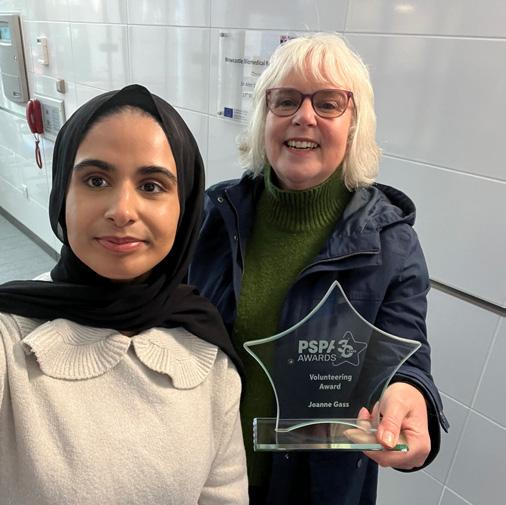
Joanne was nominated for the PSPA Volunteering Award by her sister, Alison. After their dad, Alan, died of PSP in 2011, Joanne was determined to support other families. Joanne signed up to become a PSPA Helpline Volunteer, providing telephone and email support in the evenings.
More recently, Joanne extended her volunteering support, by also becoming a PSPA Link Volunteer. Joanne said: “I was very honoured to receive the Volunteering Award. My sister Alison nominated me as she knows how much work I’ve done over the last 15 years for PSPA. Motivated by my own experience of helping to look after my dad, who died at home of PSP in 2011, I’ve helped on the Helpline for over two years. More recently I also began supporting people as a Link Volunteer too, which I’ve very much enjoyed.”
OUR PROGRESS SO FAR…
In early 2023, we published our new strategy outlining what we’re going to do between now and 2026 to get us closer to achieving our mission of creating a better future for everyone affected by PSP & CBD.
Performance measures and targets were set so that we could both track and share our progress with the PSP & CBD community.
Enable people with PSP & CBD and their families to live their best lives possible with high quality support and information.
We are committed to supporting people who are currently living with a diagnosis to live their best lives possible.
This year, with the support of the National Lottery, we started two new services –our counselling service and our online exercise classes. Both services have been very popular. We are delighted we have secured funding for another three years.
We have expanded our well attended Carers Groups, set up in 2023, to include one for male carers. A special thank you to volunteer David Pugh, who leads the group. We are continuing to learn from carers about what they need. We plan to start a group for people caring for someone who lives in a care home as we recognise the challenges can be different. The group should be up and running in 2025.
Our current strategy (2023 – 2026) outlines our goals to create a better life for people affected by PSP & CBD. Performance measures and targets have been set so that we can track our progress and share success with you. Here are some of the highlights, prior to publishing our 2024 annual report next year.
Improve the quality of life of people living with PSP & CBD through research, education and awareness raising.
We currently have eight research grants in operation alongside funding a fellowship. Building relationships with pharma companies remains high on our agenda in the pursuit of new clinical trials.
We invested in our policy and influencing work with the creation of a new post to lead in this area. In the last edition of PSPA Matters you may have seen the interview with Mark Jackson where he outlined his plans. This includes the launch of our new guide for MPs on how to support constituents with PSP & CBD, as a starting point for developing relationships with decision makers. Mark is currently gathering information about the problems of accessing Continuing Healthcare funding for lobbying work in 2025.
Put people living with PSP or CBD at the heart of what we do.
It is crucial that we make sure that the voices of people living with PSP & CBD drive our work and that their voices are heard. Focus groups have shaped the awards programme this year as well as providing feedback on new areas of the website.
We had an amazing youth group, aged from 8 to 14, who were instrumental in creating the new young people’s pages on the website. We are really proud of what they have created.
Our patient involvement in research group and services committee remain active. We are pleased we have been able to recruit new members to the groups this year and are they are continuing to provide advice from a patient perspective both internally and externally.
PSPA goals...
WALK FOR HOPE RAISES RECORD-BREAKING £90,000
To celebrate our 30th anniversary we set an ambitious goal of raising £30,000 from 30 Walk for Hope events.
A kind PSPA supporter agreed to match whatever your walks raised (up to the value of £30,000), so we had the potential to raise an amazing £60,000. Our incredible supporters more than rose to this challenge, smashing the target beyond expectation and helping us raise almost £90,000 (including Gift Aid and matched funding).
The 30 walks took place throughout the UK from early spring until late summer, and varied hugely in
the number of participants and distances walked, but the one thing they all had in common was a shared purpose of supporting PSPA’s vital work.
Walk for Hope is about getting outside and giving hope, by raising funds to help those living with PSP & CBD and talking to others about the conditions to raise awareness. Some walked, some were pushed, some dressed up and some furry participants were on a lead! Regardless of miles walked or time taken, everyone who participated had a very personal reason for doing so.
Here’s just a little selection of Walk for Hope events that took place this year.
The longest walk was by David Carter who completed an incredible 630 miles on the Salt Path.
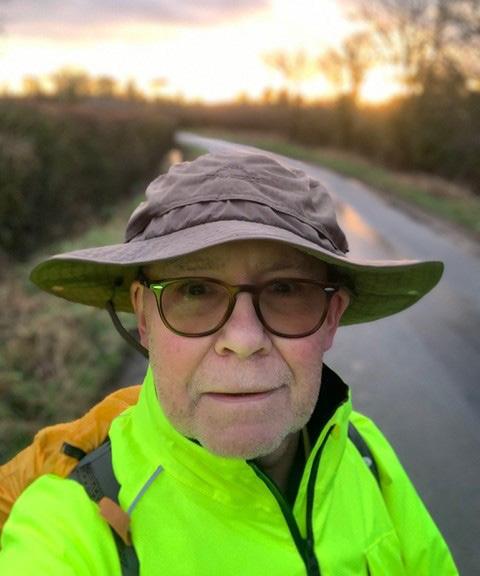

The walk that raised the most was by Fars Ghoitom and friends who walked from Bath to London in memory of their friend Francis and raised over £13,000.
The biggest walk with 102 people and 18 dogs was organised by Val and Alan Richardson and their daughter Elaine Elliott, supported by their friends, family and the County Durham Support Group.

A milestone birthday year provided the perfect reason for family and friends of Dave Pate to get together for a Walk for Hope. Dave’s wife Wendy organised the event following Dave’s CBD diagnosis.

Thank you to everyone who organised or participated in a Walk For Hope this year. Your support has made a huge difference to our work. We are now working on our 2025 plans and will keep you posted on some exciting new developments.
PEOPLE AFFECTED BY PSP & CBD HELPING TO SHAPE RESEARCH
Patient and public involvement (PPI) in research has become increasingly important and there is growing recognition that it leads to higher quality studies.

PSPA Research Involvement Members commonly known as PRIM, is our public and patient involvement group. PRIM provides an opportunity for people affected by PSP or CBD to get involved in all aspects from identifying information to share with the wider community to feeding back on the research projects PSPA fund.
The group was set up in 2022 and is currently made up of 10 people who have personal experience of PSP or CBD. The group use their real-life experience to help shape research so that it reflects the needs and wishes of people living with PSP & CBD. They do this through regular online meetings, helping to plan

research information events, reviewing PSPA literature, grant applications whilst acting as a critical friend to researchers and pharmaceutical companies.
Valerie Wallace was one of the first to join the PRIM group when it was set-up in June 2022. Valerie has volunteered for PSPA since her husband Neil was diagnosed with PSP in 2016, when she decided to set up a support group to connect with others living with the condition locally. Since then Valerie has volunteered for PSPA in many ways, including becoming an Education Volunteer and sitting on the PRIM group.
VALERIE WALLACE
HOWARD KLASS
"THROUGH REGULAR ONLINE MEETINGS WE HELP TO PLAN RESEARCH INFORMATION EVENTS, REVIEW PSPA LITERATURE, GRANT
APPLICATIONS
AND ACT AS A CRITICAL FRIEND TO RESEARCHERS AND PHARMACEUTICAL COMPANIES."

Explaining why she first got involved with PRIM, Val said: “My husband Neil was very interested in research. As a scientist himself he wanted to help push forward research in whatever way he could. Neil participated in PROSPECT and attended the clinic in Salford many times. He’d also consented to donate his brain, but sadly he died in the middle of the pandemic, so that didn’t happen.
“Sitting on this group felt a natural thing to do to help others as well as honour Neil’s memory. We meet every month online. If there is a grant application to review it is shared with us ahead of the meeting so we have time to collect our thoughts. Our role is to consider the practicalities of people with PSP or CBD being involved in the research and we often make suggestions on how to adapt the study to make it more accessible.
“One of the first tasks we did as a group was to review a study where researchers were looking at using a drug in solid form. We provided feedback that many with PSP struggle with their swallow and that a liquid form would be better tolerated. This is just one example where lived experience can help improve research studies for people with PSP or CBD who are participating in the study.
“Families who attend the support group are always keen to know more about research and how it’s progressing, so being on this group helps me to stay up-to-date. I always share the latest research findings with them, and pass on any projects where researchers are looking for participants. When I’m wearing my Education Volunteer hat, I also share with the care staff what is happening in research to give them a full picture of both diseases.
“As well as assessing grant applications we’ve also been involved in organising symposium days and giving feedback about what content should be shared more widely. It certainly feels like much more is happening in PSP & CBD research than ever before.
Every grant application is a step forward in knowledge about these two mysterious conditions.”
Howard Klass decided to become a member after his wife Steph was diagnosed with PSP. Howard said: “PSP can make you feel powerless. For me joining PRIM was a way to feel useful and to be a little closer to what was going on. I was a gastroenterologist so with my medical background I was interested in hearing about research as well as finding out more about the condition. With my wife living with PSP, I am keen to know about research developments.
“Steph’s path to diagnosis was similar to many with PSP. It took four years from symptom onset. I had first heard of PSP (known as Steele Richardson Olszewski syndrome then) back in my medical school days many years ago, but never saw or heard about PSP again, until Steph received her diagnosis of PSP in April 2022.
“Not long after joining PRIM we were asked to review a couple of scientific research applications to advise if PSPA should fund them. Our job is to consider what benefit they would have for people with PSP or CBD. You don’t have to have a medical background to be part of PRIM. Practical knowledge of either PSP or CBD is far more valuable. Everyone on the group has been exposed to PSP or CBD for a long time and is very familiar with the conditions. You don’t have to be a scientist or doctor to read an abstract of a scientific research paper to know if it will have clear relevance to and potential benefit for patients.
“One of the things that has struck me being part of PRIM is how much PSPA does despite being a relatively small charity. In particular they hold a number of research meetings throughout the year and are able to secure some of the world’s leading experts to speak. It’s clear there is a dedicated group of people, including volunteers who give a lot of their time to improve the lives of people affected by PSP & CBD.”
CLINICAL TRIAL FOR PSP
Researchers hope that a new clinical trial currently for PSP will lead to the development of a new therapy. PROSPER is a Phase II clinical trial run by Spanish pharmaceutical company Ferrer.
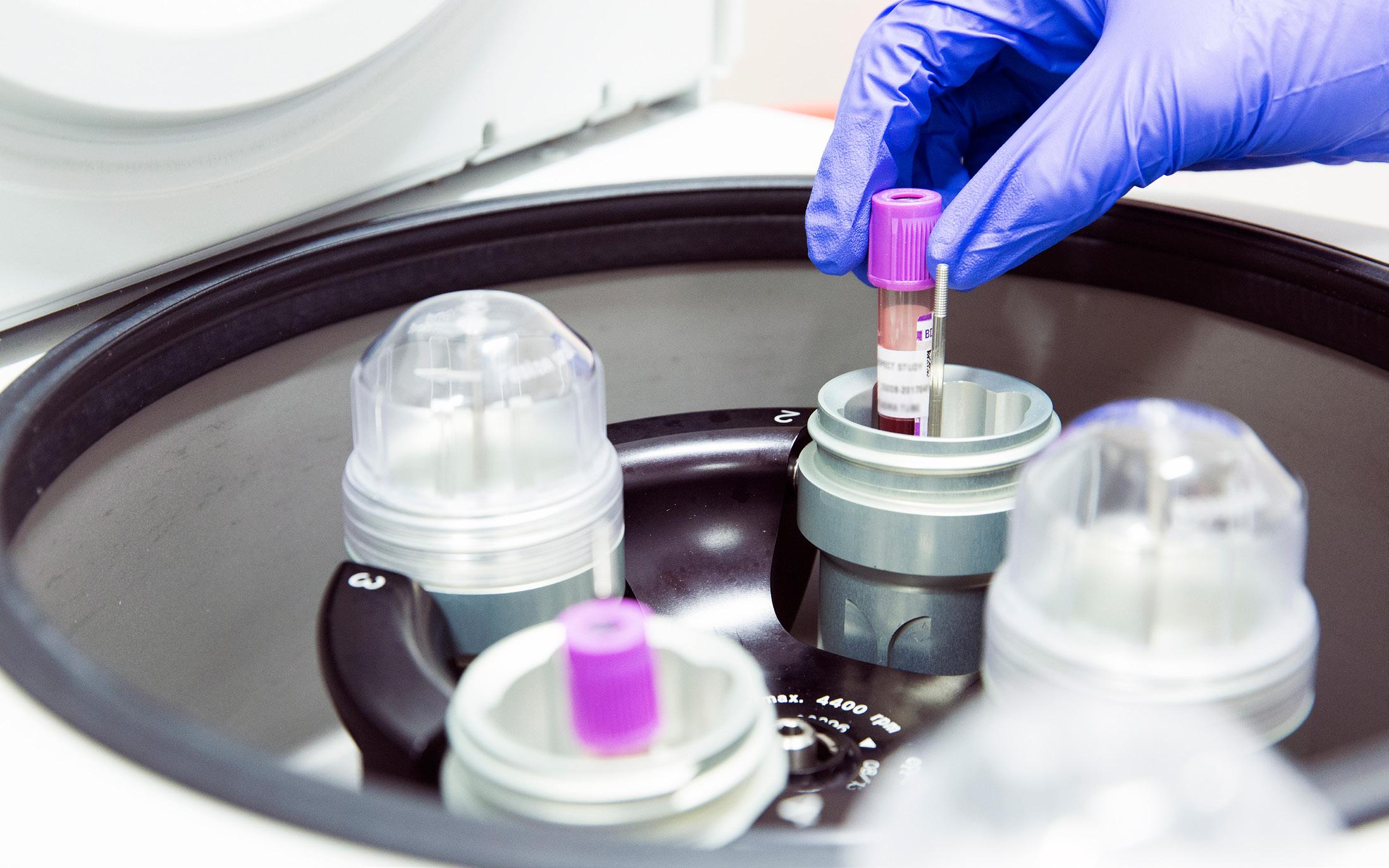
TRIAL RESEARCHERS ARE EXPECTING TO RECRUIT
UP TO 220 PARTICIPANTS
ACROSS 46 CLINICAL TRIAL SITES ACROSS THE USA, UK AND EUROPE.
The study is a randomised, double-blind, placebocontrolled Phase II clinical trial, consisting of a 52-week treatment period and a four-week follow-up period. Double-blind trials means that neither the patient or doctors/researcher know who is being given the treatment and who is getting a placebo (a dummy pill that looks the same). This is important to reduce bias in any clinical data.
The trial is to test an enzyme inhibitor called FNP-223 which aims to slow progression of PSP. It is hoped FNP-223 will help prevent the abnormal accumulation of toxic tau proteins and therefore could represent a therapeutic treatment capable of slowing down the development of the disease.
An enzyme is something that breaks down or makes bonds that alter protein structure after it has been
translated from the genes. It can alter the structure by adding or removing a functional group like a protein, sugar or lipid. These modifications to the protein structure change the way the protein folds, its stability and how it interacts with other protein and its activity.
In this case, the enzyme causes the removal of a sugar (GlcNAc) which contributes to many different cell functions. In healthy brains, this is balanced with other modifications. In brains with PSP, it is thought that too many of these sugar residues are removed, which allows phosphate to bind to tau and tips the balance. This triggers tau to detach from microtubules in the brain and clump together to form toxic tangles which are now insoluble.
FNP-223 | Mechanism of Action
FNP-223 Mechanism of Action






OGA-OGT imbalance leds to tauopathy progression
Under normal conditions there is an antagonistic cross-talk between glycosylation and phosphorylation
Glycosylation acts as a protective layer preventing tau from being phosphorylated2 . OGA enzyme removes glycosilated residues, increasing probability of phosphorilation
FNP-223 is a novel OGA inhibitor: by inhibiting OGA it maintains more residues glycosilated avoiding tau phosphorilation
In pathological conditions there is an imbalance that favors Tau phosphorylation Phosphorylation destabilises Tau and causes it to disaggregate from microtubules3: increasing neuronal instability and self-aggregating into toxic neurofibrillary tangles
INFOGRAPHIC
COURTESY OF FERRER
The hope is that FNP-223 can block the removal of the sugar residue GlcNAc, and prevent the tau clumping therefore reducing symptoms and slowing disease progression in people with PSP.
The Phase I trial of this novel therapeutic demonstrated that it was well tolerated, with no doselimiting toxicities or serious adverse events in healthy volunteers. In preclinical models FNP-223 has been shown to reduce tau aggregates, reduce neurofibrillary tangles, prolong survival and increase motor function.
The key objectives of this study are to assess the efficacy of FNP-223 by how well it slows progression of the disease, but most importantly how safe it is and how well tolerated it is by people taking it. Secondary objectives are to look at how the drug affects things such as disease severity, cognition and quality of life. There will be a comparison between baselines results and results after 52 weeks on the drug. Different measurements will be taken through clinical assessments, measuring biomarkers in blood and cerebrospinal fluid, brain imaging and questionnaires.
Trial researchers are expecting to recruit up to 220 participants across 46 clinical trial sites across the USA, UK and Europe. Recruitment is already taking place in the USA, with the other countries scheduled to begin to recruit in early 2025.
INTERESTED IN TAKING PART IN THE TRIAL?
To take part in this trial, Ferrer are looking for people between the ages of 50 to 80 who have had symptoms of PSP for less than three years. A participant will need to be able to walk a short distance with minimal assistance and have a study partner that is happy to accompany them to each visit, whether that be in person at a study site or virtually.
PSPA has been involved with public and patient involvement for the trial and has provided feedback to Ferrer on their informed consent forms and both patient and study partner information sheets. We are delighted to see Ferrer engaging with patient advocacy groups such as ourselves and American non-profit organisation CurePSP.
SCAN THE QR CODE TO EXPRESS YOUR INTEREST
Soluble
A ‘LOVELY’ WAY TO REMEMBER GRANNY
BY JASMINE BLACKBOROW
Our grandmother Penny Roberts had been living with PPA (primary progressive aphasia) for about two years before it developed into PSP.
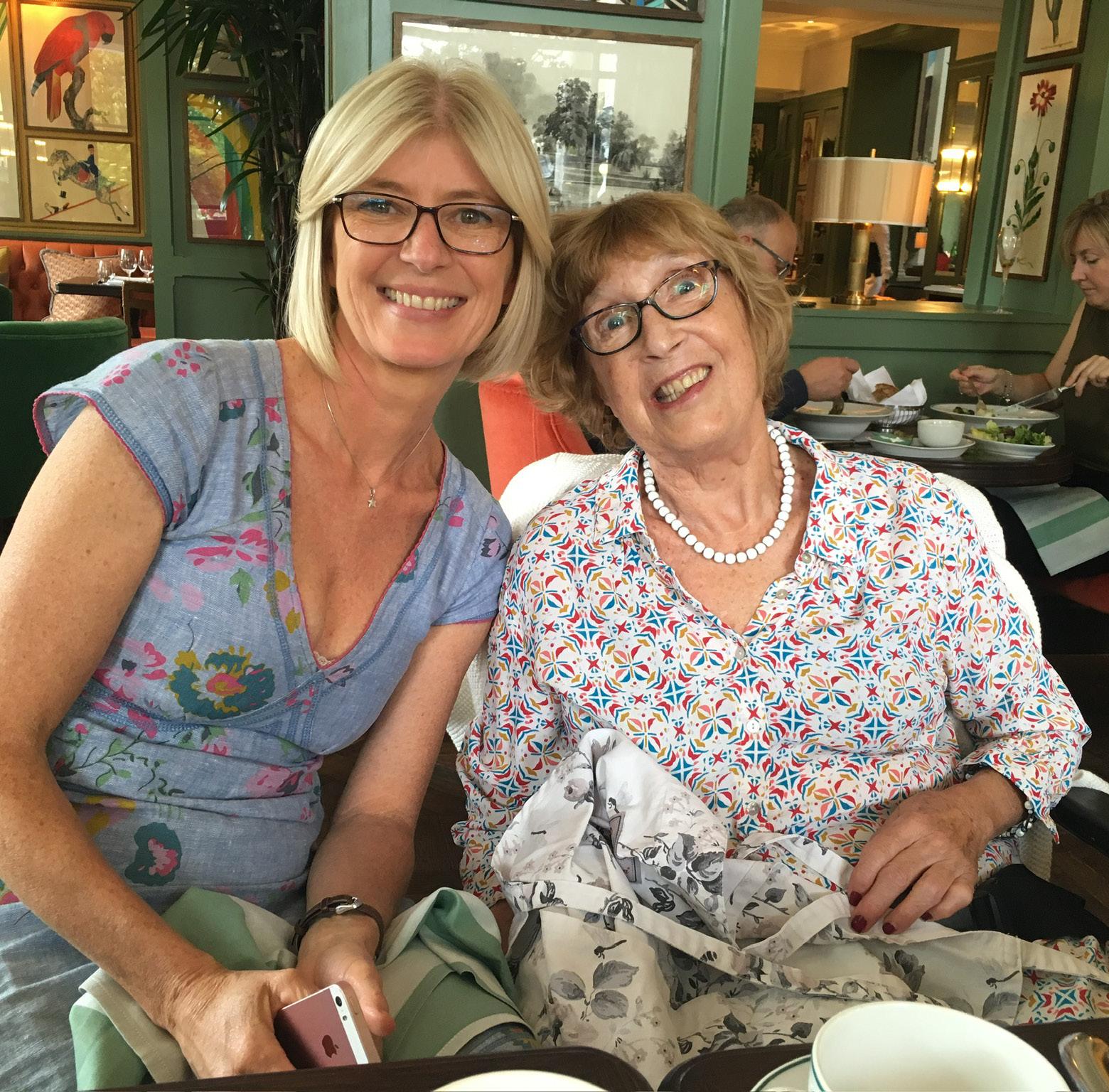
JASMINE’S MUM NIKKI WITH HER AND AMY'S GRANDMOTHER PENNY
Granny was the brightest star with the loudest laugh in any room. People couldn’t help but orbit towards her; she was confident, adventurous and a great communicator. She was also impatient, single-minded and extremely frustrating!
Illness of course couldn’t change these traits – she was always the dazzling, infuriating Penny with the big blue eyes - but it made it harder for her to be herself, it knocked her confidence and it changed her relationship with the world. As her family, it was challenging to witness; our go-getting Granny struggling to conjure words, struggling to walk without losing her balance. But every unwanted test in life brings light and joy that you would never have otherwise known – deep friendships with caregivers or hysterical laughter on the darkest of days. And it was this side of the story that we wanted to share with other people.
My cousin and I both work in the film industry. Amy is a production co-ordinator on big TV and film projects such as Lockwood & Co and Heartstopper on Netflix, and Joan currently on ITV. I am an actress - perhaps best known for playing Lamballe in Marie Antoinette on the BBC and Charly in The Gentlemen on Netflix. We spend a lot of our lives telling other people’s stories, and a year or so after our Granny had passed, it seemed like a good opportunity to collaborate to tell a story of our own. So, inspired by Granny Penny and our very female-heavy family (only girls have been born in our maternal line for six generations!) we started creating the story of “Lovely”, a short comedy/drama set in a Cornish care home.
“Yes”, “no” and “lovely” were the only words Granny could still say, so she communicated with us using these and a laminated alphabet card. This gave us an instant plot; the devastatingly hilarious conundrum of ‘Penelope’ trying to ask her family for something pretty simple - and them of course getting it completely wrong.
We pitched our film idea to Screen Cornwall, a regional off-shoot of the British Film Institute who loved it and gave us half the funding we required. We raised the rest of the money ourselves and began production in February of last year, with me as the director and Amy as the producer. It was always important for us to make a comedy. As with many families we’ve met along the way, Penny’s diagnosis was long drawn out and complicated, and we spent many years just reacting and adapting to her changing needs and abilities as best we could. And with this came many mistakes, mishaps and ridiculous situations. You could cry, but if you let yourself cry you might never stop; laughing was sometimes the only medicine.
The most important thing for this film was casting the lead role. Finding an actress who could inhabit the physical and verbal complications of someone living with PPA and PSP with both accuracy and sensitivity was going to be tricky. She also needed to have that twinkle in her eyes and be dripping with the charm and beauty of our Granny. Thank goodness for Abigail McKern: the obvious choice.
"WE WERE ALL WELCOMED VERY KINDLY BY THE PSPA SUPPORT GROUP IN WOKING, WHERE WE CHATTED WITH FAMILIES AND OTHER PEOPLE LIVING WITH PSP."
A hugely accomplished actress of stage and screen (an Olivier award winner no less, having worked extensively with the RSC and the National Theatre, and a regular in iconic Thames TV series Rumpole Of The Bailey) Abigail made us laugh the minute we met her and she took on the challenge with great tenacity. We worked with a movement choreographer Anna Healy who helped Abigail physicalise the role and discover the challenges with walking and balance that many people living with PSP experience. We were all welcomed very kindly by the PSPA support group in Woking, where we chatted with families and other people living with PSP. We also met one-on-one with Mary Burnell who lives with PSP and her husband John, who very kindly invited us into their home so that Abigail could observe and ask questions. Of course PSP symptoms can express in different ways, but this time was invaluable to our preparations. It was also an extremely rewarding time for Amy and I, connecting with families who were going through things that ours had also been through.
We shot for three days with a top crew including Director of Photography Daisy Allen who has worked on projects such as Fantastic Beasts: The Secrets of Dumbledore and the James Bond film No Time To Die. Shooting took place in a dressing room of Twickenham studios which had been completely transformed by our exceptional Art Department to look like a room in
a care home. Anna Wilson-Jones and Jasmine Hyde joined the cast as Abigail’s frazzled daughters, LibbyMai as her granddaughter Phoebe who looks on wideeyed, and Kate Handford as Pen’s superhero carer.
It was strange to write something so close to home and then have it be played out in front of a camera. In particular, Phoebe came from a combination of mine, Amy and her sister Charlotte’s experiences; what it felt like to watch the disaster of this illness unravel your family, and how helpless you can feel as the younger generation, especially when your parents try to protect you from having to deal with it hands-on. But as pen hit the page, the characters weren’t ‘us’ anymore, they became something quite other and even more so when they were handed over to these incredible actors to inhabit. The characters instead became, I hope, a conduit through which other families affected by PSP, or similar illnesses, can relate.
We then relocated to Porthgwarra beach in Cornwall, where the film culminates. Penelope’s family, having finally understood what she was asking for, take her to a beautiful windswept cove where she would run around wildly when she was younger. This was a magical part of the shoot, connecting with our Granny’s proud Cornish roots and garnering extra help from local film and TV students at the University of Falmouth.

"AS SOON AS IT’S READY, WE WOULD LOVE TO DO SOME SCREENINGS AT PSPA SUPPORT GROUPS, AND IT WILL BE AVAILABLE ONLINE FOR YOU ALL TO WATCH."

We couldn’t afford to take our whole cast and crew with us, so it was a friends and family affair, with my mum especially donning all sorts of different caps – head of wardrobe, cast PA, script supervising, transport, locations, catering…you name it, she was on it! I was pregnant with my daughter at the time of shooting and it really strikes me now how special that was, watching my mother offer bits of advice and insight to an actor playing her mother, just as she was on the brink of becoming a grandmother herself. A baby seal spent the day on the beach rollicking about and watching our little circus, her mother swimming in the sea close by. Passers-by stopped to ask us about the project. There was a constant feeling of inheritance, of family, of passing on a story.
So where to pass it onto now? The editing and postproduction stages have taken a lot longer than we would have hoped – mainly because we have been so busy telling other people’s stories again! But we hope for it to be completed and signed off soon and to submit it to some film festivals. We also intend to share it online and be used by PSPA, perhaps to raise awareness, but mainly to raise hope. Life with PSP isn’t the same, but that doesn’t mean it doesn’t continue. We still strive, react, fail, hope, and against the odds, laugh.
Speaking about making the film
Abigail said: “I was extremely pleased to be able to take part in the making of LOVELY last year and to learn about PPA and PSP for the first time. It was especially interesting to, not only portray a real person, but to have the privilege of working with direct descendants of that person. Although it was a daunting task as I was so ignorant about the condition, the production team facilitated a day of meetings so I was able to ask questions and listen to the experiences of families living with it. I felt part of a wonderful, committed team, if not family and I would like to thank everyone I met from the community for an unforgettable experience.”
As soon as it’s ready, we would love to do some screenings at PSPA support groups, and it will be available online for you all to watch.
We’d like to say a huge thank you to Helen Chapman, Carol Amirghiasvand and everyone at PSPA who has taken time to support us in making this film, and for everything the organisation does for families and people living with PSP.

A SCENE FROM THE FILM STARRING ABIGAIL MCKERN.
PHOTO: JOHN ALLEN
DAISY ALLEN (DIRECTOR OF PHOTOGRAPHY)
PHOTO: JOHN ALLEN
TO ALL OUR SUPPORTERS
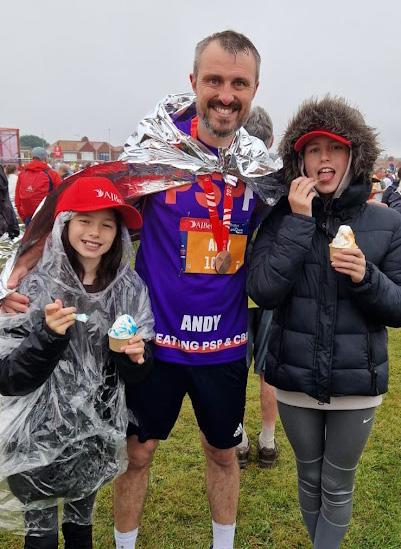
GREAT NORTH RUN
A big thank you to all of our 21 runners who took part in this year’s Great North Run. Together they raised an incredible £11,000.
GOLFERS TEE OFF FOR PSPA
Thanks to Christine Campbell, Prestonfield Golf Club selected PSPA as their Charity of the Year. The club has so far raised over £1,700 for the charity.


SHREWSBURY HALF MARATHON
James Chesters took on the Shrewsbury Half Marathon to raise money and awareness of PSP for his wife’s uncle who has been diagnosed with PSP. James has raised over £800 for PSPA.
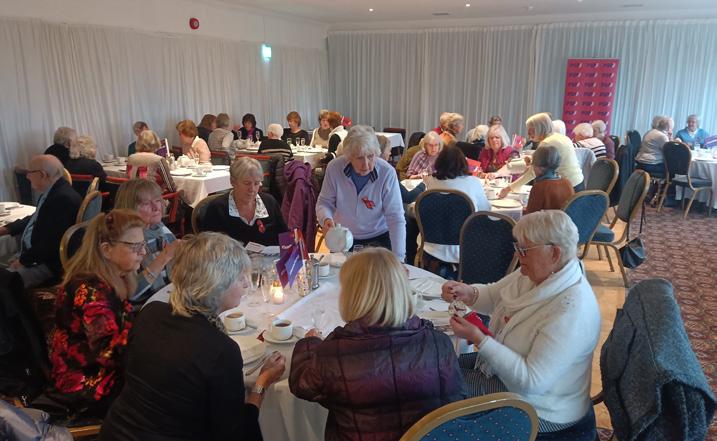
LADIES AFTERNOON TEA
Valerie Wallace organised a Ladies Afternoon Tea at Mellor Golf Club to commemorate the 30th Anniversary of the PSPA. Over 60 people attended and together raised over £800! £11,000

FAMILY FUNDRAISING
Sharon O’Gorman together with her family, took on the Chiltern Challenge Walk. Sharon and her daughter-in-law completed 10K while her daughter, son, son-inlaw, and a friend completed 50K. The O’Gorman family took on the walk in memory of Sharon’s husband Richard, who died from PSP last year. Together they raised an amazing £1,495 for PSPA.

FOR GRANDAD
Ewan Botting completed the Bristol to Bath Marathon to show solidarity with his grandfather, who was recently diagnosed with PSP. Ewan has smashed his target of £500 and has hit £840.
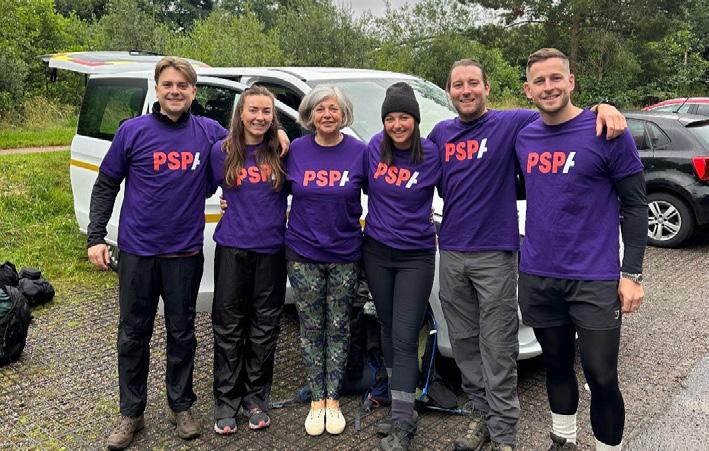
THREE PEAKS CHALLENGE
Florence Bate and friends: Louis, Aric, Miranda and Liam took on Ben Nevis, Scafell Pike and Snowdon in just 24 hours to raise money for PSPA. The group of friends raised an incredible £8,872.

FLYING HIGH FOR MUM
Claire Hilton took on the epic challenge of the Snowdonia Velocity Zip Line, riding through the skies at over 100mph to raise money for PSPA. Claire overcame her fear of heights to take on the zip line for her mother Eve, who has PSP. Claire raised a fantastic £820 for PSPA.


THAMES PATH CHALLENGE
Harry Squires and our own CEO Rebecca Packwood took part in the Thames Path Challenge. Harry completed the walk in tribute to his grandmother Angela Rankin, who sadly died from PSP in April 2022.
£2,405 THANK YOU TO EVERYONE WHO TOOK ON A 30 FOR 30 CHALLENGE THIS YEAR

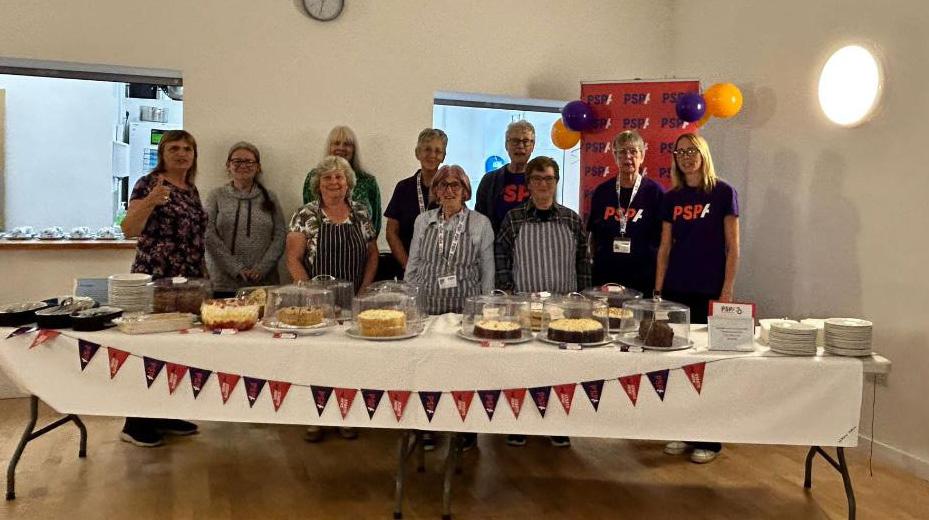
READY, STEADY, BAKE!
Jenny Knight, the Support Group Coordinator for Coventry and Warwickshire organised a tea and cake afternoon at Wren Hall. More members from the Support Group made cakes and served tea and coffee. For PSPA’s 30th anniversary, one of the members baked a special cake which was raffled off. In total, the group raised an incredible £714!
The 30 for 30 challenge to mark our 30th birthday year was created by PSPA supporter Kelly Hooper, whose mum died from PSP in 2015.
We had a fantastic response from our supporters. Thank you to everyone who got involved.
Here is a snapshot of some of the 30 for 30 challenges across the UK.
Eram Osman did 30-themed activities over several months including covering 30km in three days, did 30,00 steps every week for one month, completed 30 workouts in 30 days, took on the Chilkoot Trail covering 33 miles in 10 days and finally she did 30 social media posts to create awareness. Eram's 30 for 30 Challenge has raised an incredible £300 in memory of her mum who died from PSP.
£1,700 £300
Peter Grindley took on the challenge of hiking 30 peaks in 30 days in memory of his late wife, Janet, who was diagnosed with PSP. The total ascent climbed by Peter over the 30 days, was higher than Everest. Peter has raised £1,700.
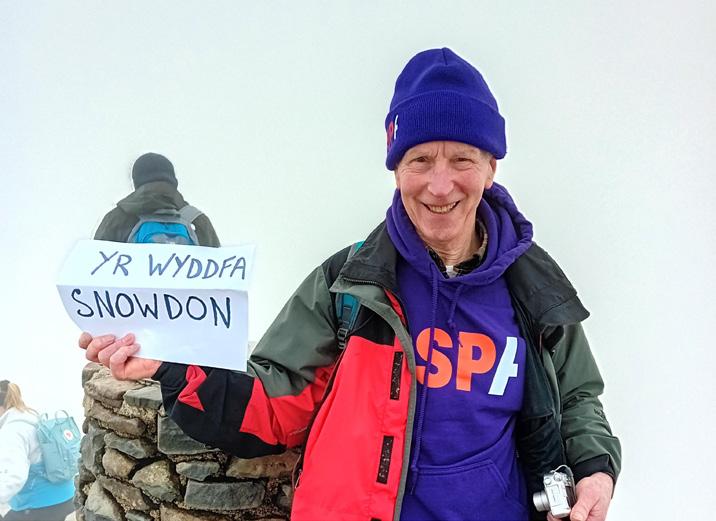


£2,000

Since being diagnosed with CBD, Josephine Foster pledged to walk three miles a day for 30 days. Josephine smashed her target and raised a fantastic £2,000.
EXPRESS YOUR INTEREST IN RESEARCH WITH PSPA!
PSPA works closely with researchers across the UK who undertake studies into PSP & CBD.
We can help link you to study coordinators who can provide information and support to help you make the decision about whether you want to take part in research. This research could include:
• Taking part in clinical trials, when a new drug is tested or repurposed
• Feeding back via patient and carers questionnaires
• Blood and tissue banking collection and banking for future research
• Brain scans
• Testing new technologies
“EVERY SMALL ENGAGEMENT WITH RESEARCH PROGRAMMES MADE MY HUSBAND FEEL HE WAS GRASPING BACK A LITTLE CONTROL FROM THIS DEBILITATING CONDITION”

SCAN THE QR CODE TO EXPRESS YOUR INTEREST
